#if anything he was attempting an in-universe explanation for why the standard of living was purposely held back in Oceania
Explore tagged Tumblr posts
Text
But it was also clear that an all-round increase in wealth threatened the destruction—indeed, in some sense was the destruction—of a hierarchical society. In a world in which everyone worked short hours, had enough to eat, lived in a house with a bathroom and a refrigerator, and possessed a motorcar or even an airplane, the most obvious and perhaps the most important form of inequality would already have disappeared. If it once became general, wealth would confer no distinction.
From "The Theory and Practice of Oligarchical Collectivism" within 1984, by George Orwell writing as Emmanuel Goldstein.
#1984#george orwell#the theory and practice of oligarchical collectivism#this is why automation has taken on such perverse forms and outcomes#because those who stand to lose the most from it are also the ones with the most power and wealth#i realize this is probably not what was on orwell's mind#if anything he was attempting an in-universe explanation for why the standard of living was purposely held back in Oceania#but it is instructive and very apt to realize how applicable this extract is to modern society today
1 note
·
View note
Note
Here's a tricky one: how DOES capturing work?
No like seriously, how does it work? When Mario throws you onto something, he gets sucked into its body and takes control of it. That's the basics, right?
But why are you the ONLY BONNETER (who's been confirmed, mind you) to use capture? Does capturing require a bond between you and another person which can explain how when one throws you onto something, they get sucked into its body, not you? And even IF you're able to use capture and be able to control what you capture ON YOUR OWN, why didn't you go after Bowser and his minions??
I HAVE SO MANY QUESTIONS AS TO HOW THIS AND THE PREMISE OF SUPER MARIO ODYSSEY WORK AND NINTENDO HASN'T GIVEN US AN ANSWER YET, WHAT ARE THE CONDITIONS HERE???
Going to step out of character for a sec to put a theory/attempted explanation on this one for fun so bear with me.
So, either bonneters are ghosts, which explains this more simply, or they're living creatures resembling ghosts, which might be the case since there's not really anything in SMO that outright confirms that Cappy is a ghost, despite the presence of them elsewhere in the Mario franchise. I'd personally subscribe to the latter honestly because Cappy being an actual ghost raises more questions than it answers. If there are sentient bombs and mushrooms in this universe, I can get around the idea of guys who look and act like ghosts but aren't really dead.
And like, magic just... exists in the Mario universe, as made clear by Magikoopas etc, and I'd argue that bonneters are inherently magic in the way of their self sustainability as shapeshifters. How can cappy think, and talk, and apparently drink tea, then turn into Mario's hat with enough hollow room for his head and suddenly have no capacity for any of the biological functions to do so? If Cappy is not truly a ghost, then he at least has some way of compressing or temporarily vanishing elements of his body when he doesn't need them (including his entirely visible eyes), like... a pocket dimension for organs, or that he is entirely made of magic in the first place. He can either tuck himself inside the impossibly small space in his own hat/head, or vanish most of his body at will, as well as standard shape shifting. And if he is a ghost, well, we can just say he's a spirit and they behave weird and leave it at that. But either way, his consciousness persists beyond the boundaries of a physical form already.
Cappy is not the only bonneter who can capture, and I'd have to assume they can do it without a third party like mario. In postgame cap kingdom, one of the bonneter npcs is wondering out loud if capturing is a new trend and if there's anything around they can capture. Glossing over the implications of a society where an entire group of people who just possess others for fun, and moving on, that suggests this is not a Cappy exclusive power, but rather something all bonneters are able to do. Also, having the superpower if being able to let other people possess things through you sounds... incredibly unuseful?
so, if Cappy is able to cleanly separate his mind from his physical existence from attributes of his physical existence, I don't think it's too much of a reach to think he could possess someone, or magically extend this pocket dimension spirit severing power on someone else to project their consciousness into something else like a weird spirit medium. I doubt a bond is even necessary since he'd known Mario for all of, what, five minutes? Before he could let him capture a frog.
I think Cappy did not go after Bowser on his own because he's established as a little nervous and having someone else to team up with probably gave him the determination to out his "go to the Cascade kingdom to find an old airship" plan into action. either that, or he was already planning to go and Mario happened to show up before he did.
Not to overanalyse a kids game though lol!
#Cappy#super mario odyssey#I just woke up sorry if there's grammatical errors here I'm not proofreading this
8 notes
·
View notes
Text
Gabriel Agreste: Interesting Villain, Horrible Character (400 Follower Special)
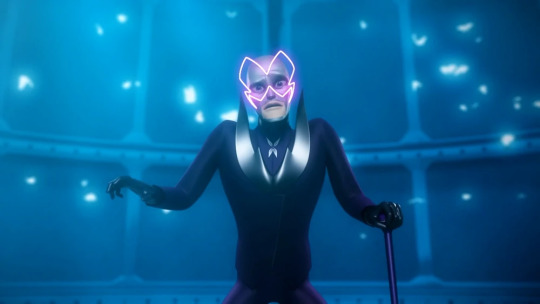
I'm honestly surprised more people didn't want me to talk about Gabriel, especially with how often I rag on how horrible of a person he is. But, three character analysis posts later, and we're going to talk about why the main villain of Miraculous Ladybug is a real letdown.
Gabriel Needs to give the Whining a Rest
The interesting thing is one of the few things I actually liked in Season 3 was Hawkmoth. His plans actually made sense (for the most part), and by playing the long game, he managed to turn Chloe against Ladybug and deprived her of several key allies. Granted, Season 4 immediately undid the latter, but I was still impressed by his strategy.
Generally, one of the better aspects of Gabriel as a character was just how over the top he was as Hawkmoth. Keith Silverstein is clearly giving it his all with his performance, and he is just so enjoyable to watch as a cartoonish supervillain.
And therein lies the first major problem with Gabriel as a character. While he is fun to watch as a simple supervillain, the show tries to give him more depth and unintentionally makes him worse.
In Season 2, when it was revealed that Gabriel was Hawkmoth, many fans speculated on what he needed the Miraculous for, until the Queen Bee Trilogy showed it was to save his possibly dead wife, Emilie. The idea of that is so the show can give more depth to its main villain, and I think it's an interesting idea in concept. After all, the road to Hell is paved with good intentions.
The problem is just how radically different Gabriel is normally compared to how he is as Hawkmoth. He always goes on about how he's “doing this for Emilie”, but it's hard to really sympathize with him when you consider he constantly gives evil monologues and evil laughs, really getting into the supervillain role. And let's not forget all of the “I'm going to wear Ladybug's skin as a suit” faces he loves to make.
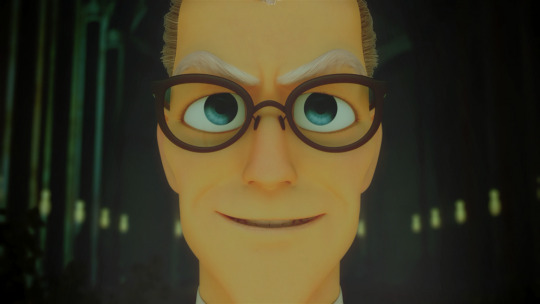
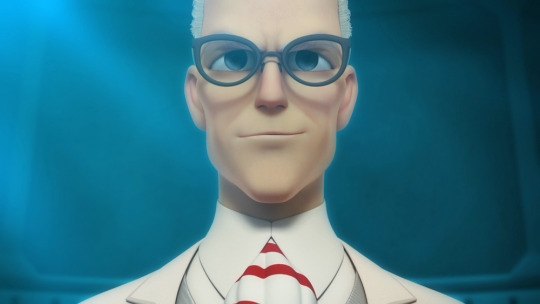
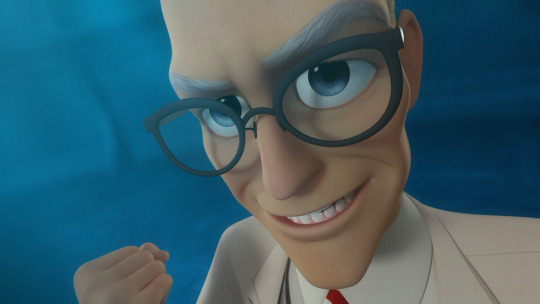
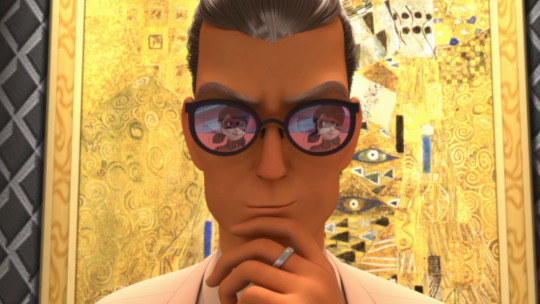
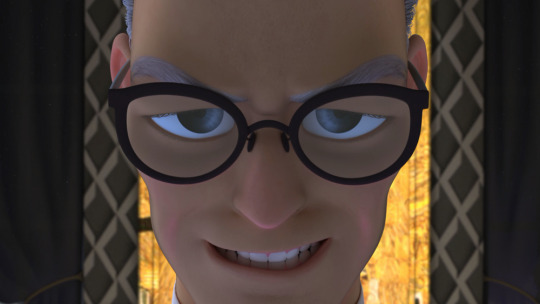
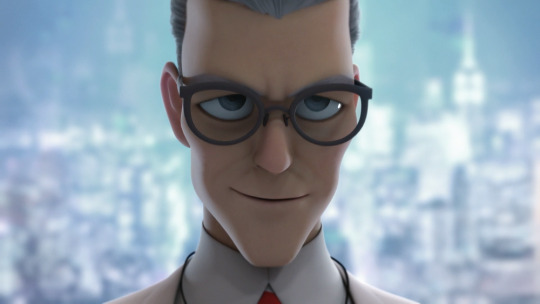
Clearly this man is the picture of mental stability.
Gabriel's motivation for being Hawkmoth when compared to what he actually does as Hawkmoth is shady enough, but the thing is that the writers clearly want the audience to at least feel a little bad for him. They want to make the audience sympathize with him despite the way he acts with or without the mask. Without Miraculous Ladybug, he is routinely putting innocent lives in danger and never once shows regret for his actions. All he talks about is how “he's doing this for Emilie”, or that “he'll get their Miraculous soon”. There's no real reason to feel bad for him other than “because the script says so”.
Let's compare Gabriel to Malcolm Merlyn from Arrow. His big plan in the first season of the show is to create a machine that will cause an earthquake to destroy a crime-infested portion of Starling City, claiming to be trying to help everyone, but it's clear he is only doing it out of revenge for his wife getting killed by a criminal from that part of the city. In addition, throughout that season and future seasons, he always makes sure his plans lead to him benefiting in some way, showing he isn't just some noble man trying to achieve his goals with a less than noble method.
If we got some moments that showed that what Gabriel was doing was selfish, it would make him a more complex villain. But we don't get anything like that. What do we get instead? Well...
I Could Really Care Less About Emilie Agreste
We have known Gabriel's motivation has been to save his wife for a little over two years at this point, but at the same time, it's hard to believe that motivation because of how underdeveloped Emilie is as a character.
There have been a total of two lines in the entirety of the show that explain what happened to Emilie, and they're both vague as hell. One of them was from “Feast” that implied Emilie used the broken Peacock Miraculous.
Adrien: My mom used to have dizzy spells… just like Nathalie.
And the other that outright tells the audience what's happening to her in a clip show that most people will skip.
Nathalie: As I've watched Emilie falling deeper into an endless sleep, my sadness for her has deepened, too
That is literally all we get for an explanation, and nothing else. We have no idea of what she's like as a person or what her relationship with her family was like other than Gabriel and Adrien saying they miss her. Other than the way the narrative says she's important to Gabriel and Adrien, we don't really have a reason to care about her as a character. There have also been some lines that imply she went along with Gabriel's questionable parenting techniques, like how he was apparently only homeschooled as a kid (Origins) and never had a birthday party growing up (The Bubbler), so how do we even know if she's a good person? In fact, why not set up this question as a mystery to make the audience wonder if Gabriel has another reason to bring Emilie back?
It ultimately turns Emilie into a plot device and not a character that Gabriel and Adrien only bring up to make the audience feel bad for them, and meant to justify Gabriel's actions by saying that he's “doing this for his family”.
But hey, if he's doing this all for his family, surely Gabriel's redeeming traits come from his relationship with Adrien, right? Right?
As a Parent, Gabriel is Far From the Best
I've talked about this briefly before, but parenting in Miraculous Ladybug is written in such a black and white way, even by the standards of this show. Parents are portrayed in one of two ways. They're either amazing people who love and support their children unconditionally, or they're awful people who treat their own children like trash. And much like a lot of things in this show, there are times where the latter is treated like the former.
There are so many times where the narrative insists on making you see Gabriel as a troubled, but wellmeaning person who tries his best to be a good parent to Adrien, but it is far from the truth.
I'm not going to beat around the bush. Gabriel is a terrible parent. Like, he is awful at being a parent in so many ways, even before you find out he's Hawkmoth. In his first appearance, “The Bubbler”, he delegates getting Adrien a birthday present to Nathalie, his assistant. He literally can't be bothered to take time out of his schedule to get his own son a present for his birthday. And as the show goes on, he becomes more controlling and forbids Adrien from going out with his friends in other episodes (Captain Hardrock, Silencer). While this could be used to show Gabriel getting worse, it's never acknowledged in-universe, with Adrien continually defending his father essentially keeping him on house arrest.
“But IOTA!” You might say. “Gabriel has made efforts to bond with his son in some episodes.” While that might be true, most of those come right after his Akumas have almost gotten Adrien killed. He only hugged Adrien and made an attempt to learn more about him after Simon Says invaded their home, he only decided to watch that movie Emilie was in with Adrien after Gorizilla nearly dropped him off a building, and he only hugged Adrien again in public after he was turned into a gold statue by Style Queen.
In fact, let's talk about how Gabriel acts in the Queen Bee Trilogy. He actually decides to quit being Hawkmoth, but it's not because he realizes all the damage he's caused. Instead, he gave up because his “magnum opus”, a stronger than usual Akuma that only got the advantage on Ladybug ironically because of dumb luck, failed. Sure, he says he can't keep putting his son in danger, but he rarely ever acknowledges that he does so in the first place. When Riposte wanted to fight Adrien, Hawkmoth did nothing to stop her other than giving her a stern warning earlier on and nothing else. Where was this attitude earlier?
Hell, even then, he immediately goes back to being Hawkmoth as soon as he sees an opportunity, not even a day after his “mAgNuM oPuS” blew up in his face (because I guess Scarletmoth was just Plan B). If he made such a big deal about caring for his son, why didn't he try harder to spend time with him? Has he ever had doubts about what he's doing before? If Chloe didn't show up as Queen Bee, was he going to follow through on his promise and try to be a better father to Adrien instead of trying to get Ladybug and Cat Noir's Miraculous?
And yeah, the whole irony is that Gabriel is doing this for his family when he is unknowingly fighting his own son, which could lead to some interesting drama if done right. The idea of how Gabriel would react to his son being Cat Noir could really lead to some internal struggles for him to go through. But then we got “Cat Blanc”, which shows just how terrible of a character Gabriel is.
In an alternate timeline where he found out his son was Cat Noir, what does Gabriel do? Does he try to steal Adrien's Miraculous while he's sleeping? Does he reconsider his actions or realize he was endangering Adrien's life?
NOPE! He just decides to akumatize him all while emotionally tormenting him, before causing the end of the world.
This is honestly one of the most appalling things I've ever seen in any TV show, because it's basically an abusive father ordering his son to listen to him all while referencing his (kind of) dead mother to back up his point. And rather than use this to show how despicable Gabriel is, the episode decides to blame Marinette for this happening. Yes, according to the show, her present to Adrien caused several events to happen which caused Cat Blanc, but this logic makes no sense. It's like blaming the JFK assassination on the man who sold a gun to Lee Harvey Oswald, instead of, you know, Lee Harvey Oswald.
Not only was this episode yet another excuse to blame Marinette for something that wasn't her fault, it leads into the biggest problem I have with Gabriel as a character.
Sympathize with Gabriel? Surely, You Jest
After everything I've gone over regarding Gabriel as a character, after all the awful things I've talked about, are you really surprised that I don't feel bad for him at all?
Gabriel is just an awful character and a despicable human being, but the show just keeps wanting me to feel bad for him. It's just so hard to when you consider everything he's done has made him anything but sympathetic. I'm just saying, it's kind of hard to feel bad for someone who tries to start World War III with the only justification being “i'M dOiNg It FoR mY fAmIlY”, especially when he treats his family like crap.
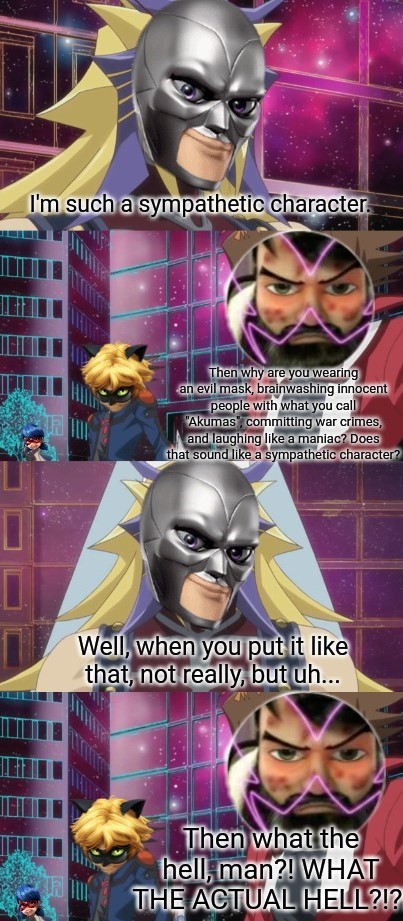
The writers go out of their way to show how horrible Gabriel is as Hawkmoth/Shadowmoth, but they think because they throw in a few moments where he looks conflicted, we'll immediately feel bad for him. What makes so many people interested in seeing Chloe become a better person is that they can tell she's the victim of a troubled upbringing, and know that because she's only a teenager, she still has room to grow as a person, represented by having more honest moments of vulnerability. Gabriel is a grown man who once caused the apocalypse because of how terrible of a parent he is, and has even fewer sympathetic moments than Chloe does. Which one of these two is supposedly irredeemable? The answer may surprise you.
But the frustrating thing is that this kind of villain could have worked. Instead of making him this mustache-twirling psychopath, show how much Gabriel regrets what he has to do, but keeps pushing onward despite all the lives he's risking if it means that he can save his wife. Instead of making Gabriel like Lex Luthor, make him like Mr. Freeze, who is basic a better written version of him.
youtube
But as it stands, there's a good reason why Gabriel gets little to no respect as a character in the Miraculous Ladybug fandom, as a villain, or as a father.
#immaturity of thomas astruc#iota#miraculous ladybug#miraculous ladybug salt#gabriel agreste#hawkmoth#hawk moth#shadowmoth#shadow moth#emilie agreste#adrien agreste#cat noir#chat noir#cat blanc#chat blanc#nathalie sancoeur#mayura#marinette dupain cheng#ladybug
314 notes
·
View notes
Note
First I gotta say that I love you and your work, it's incredible and I enjoy every post✨
My brother said that Qui-Gon and Luke are grey jedi and that Luke has a red lightsaber as backup or something like that. And I'm looking at him with mad side eye and just wanted to ask your opinion on it?
❤️❤️❤️ Aaaaaw, so sweet!!!!
... Wait, Luke has a red lightsaber? *furious typing* Ah, yes. It’s in like three Legends books, and therefore worthless.
Just kidding - but here lies the first problem. What continuity is your brother even working with? Because you cannot - and I will die on this hill even though it’s just basic common sense, cannot - attempt to reconcile the Legends EU and Lucas’ vision for Star Wars into one cohesive universe. The characters don’t work, the themes don’t work, the timelines don’t work, the ideas don’t work.
Here is a bit of an explanation on why I believe that to be the case, and the quotes backing it up, but basically, Lucas, Filoni and LucasFilms all confirmed that the extended universe was not to be considered on par with the movies and TCW in any way. I’m not saying this to criticize the EU itself, or to say people don’t have a right to find it immensely entertaining/meaningful. I’m saying this to explain why you cannot take pieces of the EU (yes, even the old EU) to try and contextualize the movies - unless Lucas/somebody on the creative team of a piece of ‘higher’ canon expressly admitted to having taken something directly out of Legends.
Now, is there such a thing as a “Grey Jedi” in the movies, or TCW? No, there isn’t, but we’ll come back to that.
The second problem is the very definition of Grey Jedi. Depending on who you ask, what decades-old Legends book you go on from, Grey Jedi are either individuals capable of using both the Dark and the Light, or simply rogue Jedi.
Breaking it down case by case: I - Are Luke or Qui-Gon rogue Jedi? II - Do Luke or Qui-Gon use both the Light and the Dark?
I (A) - Qui-Gon is characterized as a bit of maverick, but he is by no means a complete outlier to the Jedi. I’ll just drop these two very interesting posts here and here that are a bit off-topic but make some great points about Qui-Gon loving the Order and definitely identifying as part of it. We get many, many instances of the Council itself approving of him. They overrule Yoda’s vote to not have Anakin trained, they still assign Qui-Gon very important missions like the one to Naboo, and they don’t pull him out of said missions when Qui-Gon shows up with a random kid he claims to be the incarnation of the Force itself. That is indicative of a high degree of trust, to say the least - so you can say that he is ‘rogue’ in the sense that he used to eff off to wherever to do his own stuff, but he never claimed to be anything other than a Jedi, he never left the Jedi, and he never criticized the Order in the movies or TCW (yes, you can check - he never once directly says anything about them being wrong for not doing things his way; just that he will do what he feels he must.)
"Tu-Anh was something of a maverick. Much like my own master, Qui-Gon Jinn. She would disappear for long periods, conducting rogue investigations. Her activities often unknown to even the Council." ―Obi-Wan Kenobi, to Jen June on Tu-Ahn[src]
So yeah, rogue somewhat, but still a Jedi Master, trusted to the point that they would have had him on the Council had he chilled a bit.
He also never does anything in the movies that sets him apart as oh-so-different from his fellow Jedi. Arguing with the Council? Everybody does that. Anakin does, Obi-Wan does, Yoda does, Ahsoka does, the younglings do - they argue with Obi-Wan in the Ilum arc. Being compassionate/nice to people? Check out the Disappeared, two entire episodes that have Mace befriending Jar Jar Binks. Here’s a list of instances of the Council being incredibly nice. Here, here and here is Mace being kind and compassionate. Qui-Gon liking Anakin? Here’s the Council and Anakin bantering. Here’s Yoda caring about Anakin.
Again, Qui-Gon wanted Anakin trained as a Jedi, and trusted his straight(er)-laced Jedi Padawan with it in the end. There is nothing in the movies or the show saying Qui-Gon was completely separate from the Order, or in radical opposition to them.
I (B) - Luke is the Order reborn, so he cannot be rogue, as the only thing he can measure himself against is himself. There is no longer a standard to be rogue in comparison to. Considering the state of the galaxy when he becomes a Jedi, Luke simply cannot function in the same way the Jedi who came before him did, but that doesn’t say anything about a rejection of the values of the PT Order. What it means to be a Jedi - being kind and compassionate, being in control of yourself, seeking peace before violence - is embodied by Luke. Furthermore, Luke loves Yoda and Obi-Wan - the quintessential Jedi characters - deeply, and finds much of his identity in being a Jedi.
“I am a Jedi, like my father before me” would be a really weird line if Luke actually meant “but like, not a Jedi like those Jedi. I’m a me-Jedi. A not-like-them-Jedi.”
I can’t make this into a Luke meta, because it’d be too long, but I don’t get the idea that Luke could represent a rogue Jedi when, at the time of his creation, he was the one and only embodiment of an active Jedi Knight we got to see. Like, what were we supposed to compare him to to determine he was rogue/doing things ‘better’?
Luke’s story is about becoming a Jedi and getting his father to become a Jedi again as well. That story makes little narrative sense if he’s supposed to be defined in opposition to the rest of the Jedi (that, at this point in time, we didn’t know) as instead of being defined as one.
And again, the Jedi of old display just as much compassion and kindness as Qui-Gon or Luke.
-
II - No, Luke and Qui-Gon don’t use both the Dark Side and the Light, because that’s literally not how the Force works - and don’t take my word for it: here’s Lucas explaining it in details. You don’t get to do both. The Dark is selfishness. You can’t be selfish and selfless and the same time. You can’t crave power and holding innocent people’s lives as more important than even your own.
The words “light side” were never uttered in the movies and only really appear in the Mortis arc, and I dare anyone to claim they truly understand everything about it beyond “it’s a microcosm of the Galaxy/the whole Star Wars saga.” The Jedi never claim adherence to a “light side,” they say they seek balance. The idea that balance is 50% evil and 50% good is baffling to me and I blame the SWTOR video games and their in-game mechanics. (Look, if I pour 50% poison into my sugar when I’m making a cake, everybody is still dead in the end. And if I slaughter only half of the people I’ve got it for and forgive the other half, I’m still creating that many circles of hatred and revenge.)
-
Finally - if Luke or Qui-Gon were meant to be “Grey Jedi” Lucas would have called them that. It’s not the case. It’s not anywhere in the movies or TCW, hence, it’s not what he intended. They can be interpreted this way, but it’s still not what the movies where trying to say.
138 notes
·
View notes
Note
Please say more about aspirated medial stops, I was talking with my brother in law the other day about how we (Californians) don't say t's in the middle of words and I'm really curious about why that is and if this is a universal thing in all accents of English now
Disclaimer: I do have a Bachelor's in linguistics, but I got it more than a decade ago so it is possible that some of the information in this post will be misremembered or out of date.
tl;dr
Knowing how to pronounce t in different locations in different dialects is a nightmare. Old-fashioned British Received Pronunciation pronounced t in the middle of words, but there's a UK language drift called T-glottalization in which ts except at the start of words are often being replaced with glottal stops? It's really obvious in lower-status dialects but it's been creeping into RP as well.
American English usually does a weird muscle flex called a "flap" or a "tap" that's something like a really short d, or a single roll of a rolled r. I think there are some UK dialects that use this tap as well.
I belieeeeeve that Indian English usually pronounces word-medial ts, but I haven't run an actual analysis on the applicable coworkers' speech because that'd be kind of creepy?
No idea about Australia or New Zealand.
As far as I know, there's no special reason why these particular drifts are happening. Linguistic drift and accent shifts are just something that happens with living languages. If anything, we have immensely slowed the natural process of language change through the invention and widespread teaching of standardized writing.
Glossary
Sorry, I tried doing this without a glossary but I kept having to do weird info cul-de-sacs to explain myself. I've ordered them according to approximately when they'll come up?
lol I failed so hard at this, about halfway through the post I started using words without putting them in the glossary first and man idk I've been working on this post for 4 hours now and I don't want to go back through and put definitions for some of this shit, sorry
Phoneme - A single language sound, as it is stored in your brain. Represented with slashes around it, e.g. /t/.
Phone - A language sound as it actually comes out of your mouth. Represented with square brackets around it, e.g. [t].
Phonology - The study of speech sounds, from internal representation to external expression, but not including the study of how they are physically created in the mouth (that's phonetics). Not to be confused with phrenology, the racist pseudoscience of head shape.
Word - Can have a few different meanings in a linguistic context. In this post, will usually refer to either a lexeme or a phonological word. You should be able to tell from the context.
Phonological Word - What you probably think of when you think of a "word." A unit of speech that you could naturally pause on either side of, but could not naturally pause inside.
Lexeme/Semantic Word - A single phonological word and its attached meaning; or, phrase of multiple phonological words, which holds a meaning which is different than the sum of its parts. For example, "Carry the bucket" is not a single lexeme; but "Kick the bucket" is.
Voiced/Voiceless - A sound is voiced if you use your vocal cords to make it, and voiceless if you don't.
Stop - Also called a plosive. A stop is a kind of consonant you make by stopping all air flow. The stops English uses are p, b, t, d, k, g, and the glottal stop.
Aspiration - A puff of air following a sound, usually a voiceless stop. In phonetic notation, it is indicated by a superscript h following the consonant, like [pʰ].
IPA - International Phonetic Alphabet. A standard set of symbols based on the Roman alphabet and used to refer to roughly the same sounds regardless of language.
Glottal stop - A stop which is performed not by your tongue, as in most stops, but by your vocal cords. Think of the word "Uh-oh" - the way you completely stop airflow after the "Uh" instead of just letting it flow into the "oh." That's a glottal stop.
Praat - An audio analysis program tailored specifically for viewing waveforms of speech sounds.
INFODUMP TIME
So the thing about saying words is that the ideas of sounds that you have in your head ("phonemes") don't translate one-to-one to the sounds that come out of your mouth ("phones"); and the ways that these sounds get modified vary between different dialects.
Please keep in mind that when you try to speak slowly or clearly, the sounds that you make change. Linguists are primarily interested in natural speech patterns, not what we do when we're trying to enunciate.
Tater-Tot
Let's take the lexeme tater-tot, because it's the first word I can think of that has all 3 of the major weird things that /t/ does that vary by dialect.
Let's start with the word-initial t. Phonologically there are actually two word-initial t's in tater-tot, the one at the beginning of 'tater,' and the one at the beginning of 'tot.' This is because "tater-tot" is two phonological words despite being one semantic word.
In American and British English, we aspirate our word-initial voiceless stops if they're immediately followed by a vowel, which means we pronounce /p/, /t/, and /k/ as [pʰ], [tʰ] and [kʰ] respectively if they're the first sound in a word (and immediately followed by a vowel). This means we add in a little puff of air following the consonant if it's the first sound in the word. In Indian English, they don't do this - a word-initial /t/ is pronounced [t], without the extra puff of air. To American & British English speakers it can almost sound like they're saying [d], because we're not used to hearing a word-initial /t/ without aspiration.
Next we've got a word-medial t, the second t of "tater." Here, Indian and British RP English speakers pronounce it as a plain [t], with no aspiration. American English speakers pronounce it as what's called a tap or a flap, which is sort of like a half-formed [d] but is actually more like a single roll of a rolled r - and so its IPA symbol is [ɾ]. And many less prestigious British dialects, including Cockney and I believe Scouse, replace it with a glottal stop, with IPA symbol [ʔ].
And our final t is the word-final t of tot. This is a tricky one to peel apart. English generally doesn't release word-final stops - that is, you put your tongue in the correct place to stop airflow to create the stop, but you never actually move your tongue out of the way to "release" the airflow you stopped. So the easy read on the word-final t's pronunciation is that it's [t̚], an unreleased t. However, in many dialects and situations /t/ is replaced with or co-articulated with a glottal stop - for example, after an [n] or an [m], /t/ is almost always pronounced as [ʔ] in English. But unreleased stops after an oral vowel are difficult to tell apart, and if the tongue is in t position while the glottis cuts off airflow - I genuinely don't know.
Tuck/Stuck
These are good for a comparison between an aspirated [tʰ] and an unaspirated [t]. In American English, tuck is [tʰʌk] and stuck is [stʌk].
Truck
American English does weird things with syllable-initial /tr/.
I want to introduce you to the "sh" symbol, ʃ. ʃ is a voiceless postalveolar fricative, which means it's created by air rushing through a narrow space when your tongue is behind the alveolar ridge. Incidentally, when you move your tongue from [t] position to [ɹ̠] position (ɹ̠ being the symbol for the version of non-rolled r that most English dialects use), it will naturally create the ʃ sound as it moves.
We have a special letter combination to the phonemic /tʃ/ in English. It's "ch". As in "change."
You almost certainly pronounce "truck" as [tʃɹ̠ʌk] "chruck" and just don't notice.
So what's going on with Martin?
So first off, Jonny is probably wrong about how the Archivist says "Martin." Complete deletion of the r in that position is standard in RP. I haven't fed The Magnus Archives into Praat or anything, so it's possible he's letting a hint of a rhotic accent bleed in to the Archivist's RP - but I really doubt it.
This isn't unusual! It's very common for people's internal concept of what sounds they mean to make, to get in the way of them accurately identifying what sounds they're actually making. No one thinks they've ever said "chruck" until you point it out to them.
I would probably transcribe the Archivist saying "Martin" as [mɑ:tɪn].
Jonny's attempt at saying "Martin" in an American accent was something more like [mɑ˞ɹ̠tʰɪn]. He did a good job of rhoticizing the vowel, but in his focus on the r completely messed up the second syllable.
I'd transcribe my own pronunciation of "Martin" as something like [mɑ˞ɹ̠ʔn]. It's been my observation that t-glottalization in American English is especially common when adjacent to nasals - and if there's one thing American English likes, it's syllabifying liquids in word-final syllables.
OK I've run out of steam now
This was fun. Sorry about the declining quality of explanation. Please feel free to ask more if you dare to reignite the flames of infodump
#infodump#linguistics#the letter t#phonology#english phonology#english dialects#dialects of english#ask button#ask boombutton#ask theboombutton#jonny sims
9 notes
·
View notes
Text
It’s okay, you adorable cutie | Hinata Shouyou
Inspiration: [Gigil]
Category: fluff
1.2k words; you can never stay mad at your sunshine

Gigil (n. Tagalog)
/ˈɡi.ɡil/
: the urge to pinch or squeeze something unbearably cute

You can confidently say that your boyfriend is the most adorable and cutest person in the entire world, and maybe even the universe. No, definitely in the entire universe. Everyone who has ever met him agrees with you, gushing over how bright and energetic he is in every aspect of his life. Well, nearly everybody, seeing how some of his friends are a bit reluctant to admit any kind of a nice comment towards your sunshine.
The fact that he’s so cute and sweet and willing to do anything you want to do squeezes down on your heart. That, coupled with his ever-present smile, is enough to make you forgive every single thing he does. Even if it means he’s practically trashed your kitchen to the point of no recognition.

The pungent odour of smoke makes you cover your mouth and nose as you walk into the apartment. Thuds can be heard as Shouyou zips around the house, turning on fans and opening windows to let the smoke out. The air clears a bit and you can breathe.
“Shou? What’s going on? Are you okay?” He stops at your voice, frozen into an awkward stance with one of his legs raised into a step while his arms are stretched far. He immediately shoots across the hallway and stops right in front of you, hands slamming against the walls to block you from fully entering the house.
“[Name]-chan, you’re back early!” His voice wavers as he ignores your question. “H-how was work?”
“It was fine…” You attempt to peek behind his shoulders and into the living room but Shouyou responds by shifting his body so that your line of sight is blocked. You move and he immediately follows. And again. And again. It’s like a weird dance of bobbing heads, which would normally be funny if your boyfriend isn’t being so odd. “We finally finished on the contract with our dealer so we were allowed to take the day off. Why is there smoke in our house? Did something burn? Are you hurt or not?” You cup his face in your hands, eyebrows creasing in worry.
Shouyou might be an adult now, and a damn fine one at that, but it doesn’t stop him from being clumsy and forgetful. Like, all the time. You can fondly recollect a sunny day last spring when he went to do a routine run and forgot to close and lock the door. A bird chirping on your bedframe was what woke you up. He also forgot to give you a morning kiss that day, so maybe he was just out of it that morning. Or that time when he nearly slammed his head on a coffee table by tripping over something invisible in Ikea. You had never been more glad for his god-like reflexes and held him in a tight grip for the rest of the day.
“I’m not hurt, don’t worry!” He kisses your palms in an attempt to reassure you, but his eyes are shaking at a magnitude of 7.9. “I’m fine, but um… please don’t be angry!” You stare at him quizzically as he steps aside to let you in, hands taking away your bags.
The reason for is nervousness becomes clear by the first glimpse you get of the kitchen. Or the thing you assume is still your kitchen. There’s a huge black marking on the wall behind the stove and wisps of smoke are still rising from the charred pan. Various ingredients are littered all over the countertops and water seems to be splattered across the walls. Broken pieces of china cover the floor. The shards are spread out so much that you could have nearly stepped on one if Shouyou didn’t lift you up with a yelp of “be careful!”
Turning to your boyfriend, who’s now hung his head with a crestfallen look, your mouth open and close silently as words escape you.
“Care to explain, Shouyou?” He flinches at your tone and the use of his full name, something you only do when you’re either irritated or angry. He fiddles with his fingers before rambling out an explanation.
“Well, you were really stressed with the whole contract thing because you said the other person was being unreasonable and that… they were going to be the death of you. I hate it when you talk like that, so I thought maybe you’d be cheered up if I made your favourite food. You always smile when you eat it, I even got your mum’s recipe! “So I put the pan on heat, put some chopped vegetables in it and started looking in the cupboards for the pretty plates I remember you buying a while ago. But then the pan caught on fire somehow while I wasn’t looking and the fire alarm surprised me which made me drop all the plates and I’ll replace them, I promise! Don’t worry, I know which ones I dropped! “And then I was just panicking because the noise was so loud and there were broken pieces of glass and I ended up making a mess because I tried to put the fire out by spraying it with water and it went everywhere… And then you came in…” His voice shrank into a meek squeak under your glower.
“Shouyou.” He immediately kneels at your disappointed voice, mindful of the china shards. Grasping your hand, he looks up with trembling lips.
“I’m so sorry! I’ll clean it up by myself and never, ever try cooking again! I just wanted to do something for you and it ended horribly, please forgive me!” A sigh escapes you at the state of the kitchen which looks hopeless. And yet a small spark of affection also makes you smile. While his execution wasn’t great, Shouyou always has the best intention at heart and is constantly trying to help you.
“C���mon, Shou. We need to clean this up. And then we can cook together, I’ll show you how to do it.” That seems to perk him up to his usual level of enthusiasm and liveliness. He leaps up onto his feet and crushes you in his embrace, littering small pecks of affection onto your face.
“Thank you so much for not being angry with me… I’ll promise I’ll never try cooking at home if I’m not with you!” A flash of his signature adorable smile made you giggle as well, pinching both of his soft cheeks with so much strength that he yelps and begs you to let go. How a 172 cm, buff pro athlete who’s one of the best in the entire country manages to be so cute is beyond your level of comprehension.
The night is spent deep cleaning the kitchen and trying to recreate your mum’s cooking. Unfortunately, it doesn’t reach the golden standard but it’s still absolutely delicious and delightful. Shouyou fills his cheeks with the food like a chipmunk and smiles when you poke at it.
“This is great, Shou! I think you have talent as long as you’re under a watchful eye!”
“Really? Then I’ll try more and more with you until I have a buffet of your favourite foods in time for your return from work! It might take years, but I’ll do it one day, I promise!”
#hinata x reader#hinata imagine#hinata shouyou x reader#hinata shouyou imagine#haikyuu x reader#haikyuu!! x reader#haikyuu imagine#haikyuu!! imagine#haikyuu one shot#haikyuu!! one shot#haikyuu#haikyuu!!#hinata#hinata shouyou#fluff#insp: word#gender neutral reader
107 notes
·
View notes
Text

[WARNING: In-depth discussion of human remains along with relevant images, some of which may be disturbing.]
In the electric hustle of the mid-1980s, there weren’t many eyes turned toward the loneliest corners of the Canadian Arctic. It was a forward-momentum period, caught up the 20th century’s mach-speed technological progress and cultural change. In all of this movement, it took something quietly monumental to turn heads toward the past and look, quite literally, into its eyes. The world looked into three 140-year-old graves in permafrost, and found three sets of eyes wearily looking back.
Their names were John Torrington, John Hartnell, and William Braine. In Victorian society, they would have faded into the backdrop of the social tapestry. One was a working-class petty officer, another a former shoemaker that had recently joined the Navy, and the third a private in the Royal Marines. In their world, they were perfectly ordinary—but it was their deaths that made them extraordinary. In time, they would be called the Beechey Island or Franklin Expedition mummies, and would become instrumental in helping to solve one of the greatest mysteries in exploration history.
In this first Mummy Monday, we’ll explore the lives and deaths of the Beechey Island trio, as well as their forensic results, cultural impact, and a further look into their unique process of mummification.

The Franklin Expedition
In international news, the Franklin Expedition has been something of a hot topic as of late. New artifacts, incredible discoveries, and potential vacation routes; not to mention a critically-acclaimed television series in 2018! Its impact is present in multiple facets, but it can be hard to gain a full scope of what it was and why it matters.
The quickest, dirtiest summary is this: in 1845, the British Admiralty sent two well-fitted bomb vessels—HMS Erebus and HMS Terror��into the Arctic to ply the waters for the fabled Northwest Passage. It got very, very cold to the point that the land was inescapable and all 129 men aboard succumbed to any number of horrible fates—disease, starvation, exposure, and possibly even more violent ends. Say what you will about ominous-sounding names for these ships and risking fate, but the results were horrifying across the board. Scottish explorer John Rae even made discoveries of cannibalism among the wreckage of what was to be the most promising of Her Majesty’s exploration attempts, much to the public’s disgust, chagrin, and fascination.

There is, of course, so much more to the story than just a few quick notes about the horrors nature can inflict and the question of imperialistic hubris. One peek into the fae realm of Franklin-related academia is a little bit mind-boggling, and there have been plenty of glorious attempts to parse it all out. The sources range from contemporary to theoretical, and as much as people agree or disagree, the siren call of Frankliniana can be hard to resist.
So where the hell do you start?
For the sake of Mummy Monday, we’re starting where most of Franklin’s rescue attempts did:

Beechey Island.
Beechey Island
It’s a forbidding corner of the Canadian Arctic, even today. Nestled at the foot of Devon Island in the Wellington Channel of modern-day Nunavut, it can appear either unremarkable or dread-inspiring, depending on the day and the weather. Its nearest inhabited neighbor is the town of Resolute, although its name in Inuktitut gives a better sense of the landscape: Qausuittuq or ‘the place with no dawn’.
Most explorers tracing the steps of Franklin stop in Resolute to charter passage to Beechey Island. Although there are animals living near the area (different species of sea bird and the iconic polar bear), the tourism sector of Beechey Island is profoundly dedicated to the quiet contemplation of the remains of Franklin’s first winter camp. Scattered across the stones are broken pieces of wood and rusted rings of old Goldner’s cans. To this day, it’s possible to see the ongoing decay of history in the shadow of memorials left behind by past searchers.

And then there are the graves.
The original headboards are now stored at the Prince of Wales Northern Heritage Centre in Yellowknife. Weather-resistant replacements still bear the same messages as the originals, each recalling the names, statuses, and death dates of three of Franklin’s men. Two graves, from Erebus, have ominous-sounding Bible verses tacked on to the epitaphs.
There is a fourth grave belonging to Thomas Morgan, an able-bodied seaman (AB) from the HMS North Star who died during a search for Franklin in 1854. Morgan is entombed alongside his Erebus and Terror predecessors, but he has not yet been exhumed.
And yeah, exhumations. That’s what we’re here for on Mummy Monday, after all!
In 1984, Dr. Owen Beattie of the University of Alberta led a crew of researchers and scientists to this lonely point in the Arctic Circle. At the time, he was entertaining the possibility of lead poisoning being a factor in the ultimate fate of the Expedition. Part of this consideration came from the bajillion cans littered across the extensive trail, each soldered shut with clumps of lead that Beattie believed leached into the food the men were eating. Beattie had good reason to pursue this theory! His belief was that the acidic nature of some of the canned food would have caused a breakdown in the lead solder, causing the food to become contaminated. Even without this theory, he wouldn’t have been off the mark at all. Later discoveries contemporary to the Expedition found other cans manufactured and sealed by Stephen Goldner to have gone completely rancid. That, outside of the lead-poisoning theory, certainly wouldn’t have helped matters. Another explanation pointed to the lead piping installed in the ships themselves. Would water passing through these pipes have poisoned the men in the process of drinking or breathing? What about lead-based paints, often needing to be applied throughout the year in new coats, and condensation to follow on steam-powered and heated ships? What about the nature of being a person in the Victorian era in the first place? You were probably about as leaden as a musket ball.
So Beattie made his trek north, intending to exhume John Torrington and crossing his fingers on the possibility of exhuming John Hartnell. People knew these men had died young, even by Victorian standards. Torrington was 20 years old, Hartnell 25, and William Braine 32. Torrington and Hartnell died within three days of one another at the beginning of January, 1846. Braine died only a few months later in April. If Beattie’s theory was correct, then lead may have played a part in why these men were dropping like flies after only a few months on the Expedition.
As detailed in his book, Frozen in Time, great pains were taken to get permits and carefully exhume John Torrington. It was far from easy. Beattie and his team had to dig, pick, and melt their way through around six feet of gravel and cement-hard permafrost. They had entertained the possibility that permafrost might have preserved the bodies; they had no idea how right they were.
After uncovering one black coffin, edged in decorative white tape and bearing brass handles (one was still in the ‘up’ position), they carefully melted through layers of ice until one researcher reached a piece of blue wool cloth. As gently as possible, he tugged aside the cloth and revealed the frozen face of John Torrington.

Petty Officer and Lead Stoker John Torrington seemed to wearily peer back at the researchers. And he was, in fact, peering. Torrington’s body had been almost perfectly preserved, including his eyes, other soft tissue, and cartilage. His striking appearance startled the researchers, understandably. They had been expecting some degree of preservation, but not this.

He was only 5′4″ (163 cm) and weighed just under 88 lbs (40 kg). Dressed simply in clothing that showed exactly how underweight he was at the time of his death, something about his appearance struck some emotional chord with the team. In Frozen in Time, Beattie quietly makes the comment that Torrington looked, “just unconscious” and “anything but grotesque”.
“The expression on his thin face, with its pouting mouth and half-closed eyes gazing through delicate, light-brown eyelashes, was peaceful. His nose and forehead, in contrast to the natural skin colour of the rest of his face, were darkened by contact with the blue-wool coffin covering. This shadowed the face, accentuating the softness of its appearance. The tragedy of Torrington’s young death was as apparent to the researchers as it must have been to his shipmates 138 years before.” (pp. 171-172)
His jaw was bound shut with a polka-dot kerchief (think Jacob Marley) and his limbs were tied together using cotton wrapping. Researchers made note of his hands, which showed some of the greatest degree of his preservation.

What was even more incredible was the full degree of flexibility his body retained. Beattie and a team member lifted Torrington from his coffin for his full autopsy, and as they did so, Torrington’s head rolled onto Beattie’s left shoulder. Beattie also noted how light and limp Torrington was more or less like lifting an unconscious child.
Samples were taken of Torrington’s hair, nails, organs, and brain. The fact that these samples could be taken at all was incredible, especially in their state of preservation. After this was done, Torrington was reburied with the utmost respect and the expectation that the grave itself would refreeze from encroaching water. Not only would Torrington be preserved physically, but his photos were about to preserve his memory in ways no one could really expect.
But, of course, he was just one of three.
John Hartnell and the ‘Face of Death’
Researchers literally brushed the surface of Hartnell’s grave in 1984 as time constraints prevented them from doing a full exhumation. They had enough time to do an initial dig and uncover part of him, which was enough to sate their curiosity for the moment. Undoubtedly, they still thought of Torrington’s repose and his more delicate features.
They weren’t really prepared for, uh...
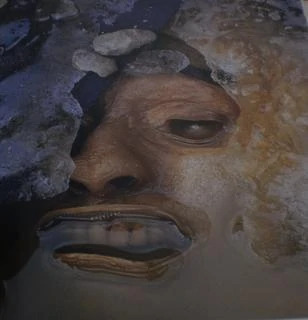
Probably the most pissed-off mummy known to man. At least, that’s what he looked like. One researcher, Walt Kowal, might have summed it up best when he remarked, “This guy is spooky. The quintessential pirate. This guy is frightening.” (p. 184)
He wasn’t entirely wrong. Something about John Hartnell’s face seemed angry, and it didn’t help matters that his right eye was missing. As the water drained away, John Hartnell grimaced where Torrington had just seemed to passively observe. In time, the entire figure of AB John Hartnell emerged.
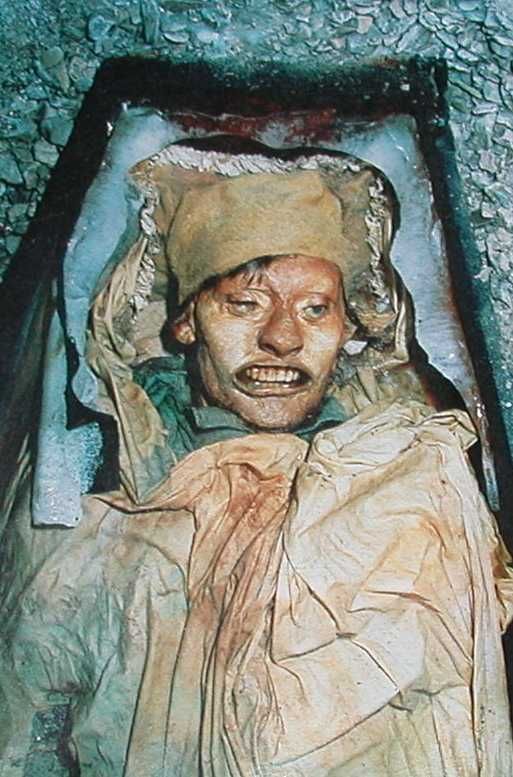
Dark-haired and hazel-eyed, Hartnell appeared to be something of Torrington’s opposite. Both men had the distinct features of mummification-in-ice, such as the receded and pursed lips from the water and the half-open eyes. That was where the similarities ended, however. Hartnell was bundled up in a blanket and shroud with his head resting on a pillow, where Torrington laid on a bed of sawdust (often mistaken in pictures as his hair). Pains had been taken to make Hartnell look presentable; his hair was combed and cut, his nails trimmed, and his body dressed in three shirts and a hat (no pants, though).
The question remained almost tangible: why were these men so different?
As the researchers reburied the remains and returned to Alberta to pore over lab results, so to am I going to take a step back and look at their lives in detail.
The Men Behind the Mummies
There’s not much I can say about Torrington that hasn’t been beautifully covered in magnificent detail by my Torrington research counterpart, @entwinedmoon. Her Torrington research series absolutely floored me with its depth and clear passion for the subject! Literally everything about his life, death, and afterlife is covered in there, so I can’t recommend it enough. And I absolutely agree with the sentiment that tracking Torrington down is like cryptid-hunting. Oof.
What I can say in a pale shadow of entwinedmoon’s work is that John Shaw Torrington was born around 1825 in the city of Manchester, making him around 19 or 20 at the time of his death. He hadn’t served in the Navy prior to being assigned as a petty officer on HMS Terror, but his lung tissue showed that he’d definitely been exposed to the amount of smoke expected of both a lead stoker and a Manchester resident (given its Victorian reputation as a pollution-belching beast of a city). Exact details of his life are hard to follow, making him something of a shadowy figure for being so front-facing after his death. Examination of his hands showed that at the time of his death, he probably hadn’t done much work between his illness and the fact the ships were frozen in and thus not really needing someone to work their locomotive engines.
And he’d been sick. Really sick.
In the end, it was a combination of tuberculosis and pneumonia that sent John Torrington to his premature grave. He’d been, as discussed, incredibly underweight, but had been well enough to pass a health check in Greenland when some of his comrades had been sent back to England for similar health issues. The when of his illness isn’t known, but it had lingered long enough to thoroughly emaciate him. Had he been sick prior to leaving England and just covered it up? Possibly. Had he been sick but had a flare-up at some point after the health check? Also completely possible.
In short, after his autopsy it became clear that everything about Torrington’s body was at active war against his life. He’d been small in build and had lungs so scarred with smoke and illness that lung tissue adhered to his chest wall. This wasn’t a man destined to live very long.
As opposed to his neighbor.

A personal aside, John Hartnell is my favorite. I’ve spent years researching his life, his family, and every detail I can hunt down about him, and it’s taking a lot not to just fly right into overshare mode. I can say that Hartnell’s mummy wears a lot of reminders of his life, along with the life of another one of the Expedition’s non-mummified members.
John Hartnell was born in 1820 in Gillingham, Kent. He was the oldest of five siblings and after the death of his father in 1832, immediately went to work as an apprentice shoemaker. Yeah, not a Navy man or a dockyard worker like his father. He signed his name on a form dedicating his time and effort under one Henry Sarge and went to work crafting footwear. A necrotic right wrist bone tells a story of repetitive movements and damage. Growth arrest lines in his ankle bones say that the 5′11″ (180 cm) Hartnell had actually had his growth stunted around the onset of puberty, possibly owing to malnutrition. However, letters from his mother Sarah and brother Charles paint the image of a close-knit family avid to support one another.
So close-knit, in fact, that John was one of two Hartnells on Erebus. His brother, Thomas, was two years younger than him and accompanied John as an AB. Their names appear beside one another in the muster books (possibly including a cousin, John Strickland) and John was buried in one of Thomas’ shirts, with the initials embroidered on a shirttail.
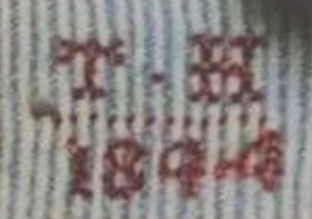
Although no known letters exist from John or Thomas Hartnell, the grave contents alone paint a remarkable picture of family ties in extraordinary conditions.
A new question arose, however. Torrington may have been marked by fate with his illness, but Hartnell had been healthy even past the health check in Greenland. What had happened to him?
For that, we need to go back to Beechey Island in the summer of 1986.
‘Son of a bitch! He’s been autopsied!’
Beattie and his team returned to Beechey Island in June, 1986 with a renewed sense of purpose and, of all things, an x-ray machine. It was set to be the first time such a machine would operate above the Arctic Circle and the team was both eager to try and dreading the worst case scenarios. Results from Torrington encouraged them, as the lab gave the news that Torrington’s hair had showed lead levels far above average, further pointing toward the lead-poisoning theory. Now the researchers were prepared to see if the same held true of John Hartnell and William Braine.
Unfortunately, very little is known of Royal Marine William Braine, aside from the fact that he was a private from Somerset. He’d been married prior to his departure, and seemed to come from a large, poor family. Economic reasons may have led him to join the Royal Marines, and he’d had no choice in where he was set to be assigned. Just as with the rest of the Marines in the Expedition, they were to serve in the Arctic regardless of their choices, and at a regular pay rate as opposed to the regular crew’s double pay. Aside from this, Braine’s life is well-obscured by history at the moment, so I won’t go into his results as much as Hartnell’s which can be correlated with his personal history.
The team re-exhumed John Hartnell after a good deal of difficulty, as shown in this incredible NOVA documentary aired in 1988. In the two years since the last exhumation, very little had changed in Hartnell’s appearance. The main difference was that his remaining eye appeared more sunken, but clearly the ice had done its job in preserving him.
This time, the team cut away his toque and revealed, of all things, a full head of hair.

Brian Spenceley, a physics professor at Lakehead University in Thunder Bay, stood in as a photographer during this exhumation. What made his presence remarkable was the fact that he was John and Thomas Hartnell’s great-great nephew. It’s somewhat eerie to see him in the NOVA documentary, juxtaposed with images of Hartnell that are clear enough to show some family resemblances.
Like Torrington, Hartnell was removed from his coffin for a full autopsy. Unlike Torrington, Hartnell was subjected to x-rays which required removal of his clothing. And very much unlike Hartnell, removal of his clothing revealed another detail that, at risk of sounding clickbait-y, shocked the researchers.

He’d already been autopsied.
Hartnell bore the scars and stitches of an upside-down Y-incision that terminated at his hips rather than his shoulders. It correlated with some initial results of his x-ray which showed a scrambling of organ material, some in places where it shouldn’t have been (his liver in his shoulder, for instance).
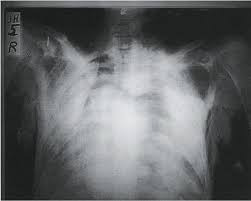
According to Beattie, John Hartnell had been autopsied while still on Erebus, presumably under the hands of assistant surgeon and naturalist Harry D.S. Goodsir. The autopsy appeared hurried, with Hartnell’s chest plate being replaced upside-down as well. Beattie estimated that the entire procedure lasted no more than a half hour. However it had gone, someone had quickly cut out his organs, examined some (such as his heart) in detail at the point of a scalpel, and then shoved the organs back in without a care as to where they went. There are plenty of explanations for the time constraints, including the cold, the threat of disease, and the possible pressure of doing an autopsy under the scrutiny of superstitious sailors and a distraught younger brother. All in all, it gave the team a remarkable chance to observe a Victorian autopsy as they did their own.
As with Torrington, the team took samples of organ, bone, nail, and hair for later analysis. Hartnell’s appearance pointed yet another accusing finger at tuberculosis, but not with the lung damage as sustained in Torrington’s body. It was possible there was something else at work with Hartnell.
Also, a polar bear interfered, leading to one of the best forensic case notes I’ve ever seen.

Once autopsies and x-rays were concluded (the x-ray machine worked fine, provided it was being warmed by a fish tank water heater), Hartnell was wrapped in a linen shroud with his clothes placed in a bag to be buried with him. With Spenceley present at the reburial and the thought that Thomas Hartnell had been at the graveside 140 years prior, the whole situation carried an extra emotional weight. As Spenceley recalled, at the end he felt as though he was burying someone he knew.
Once the grave was replaced as accurately as possible following archaeological diagrams and photographs, the time came to exhume the third mummy, William Braine.
And he didn’t look quite right.

Whereas Torrington and Hartnell had retained something of a lively appearance (loosely, at least), Braine looked well and truly dead. He had clearly decomposed to some degree before the preservation qualities of the permafrost could take effect. His eyes were sunken into his head, his skin wax-like, skull prominent, and body slightly twisted in the coffin. One arm was tucked under his body to make him fit into what seemed to be an ill-fitting coffin that, unlike the other two, was not fitted to his measurements. Even the lid had been shoved down until it pressed against his nose and deformed it slightly. And even worse, the skin of one arm showed rat bites. Obviously, it had taken a good while for poor Braine to actually be buried. Like I said, he was 32 at the time of his death. His body sure doesn’t make him look 32.
His x-rays were far more conclusive in the cause of his death, but less so in the case of his burial. Braine’s spine had been literally twisted by tuberculosis.
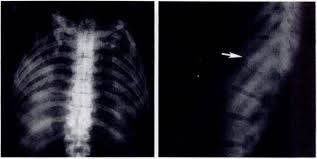
It clearly had more time to wrack his body. He weighed about as much as Torrington had but stood at 6′0″ (181 cm). A theory arose that Braine had possibly died in a sledge group, causing his companions to haul his body back to shore. He had probably been kept in the hold for some time, in accordance with the bite marks and level of decomposition.
Sadly, as said, little is known of Braine’s life. He was illiterate, having made an X mark in the muster records. No letters have been found addressed to him or from any of his siblings. While one cursory biography was written by a possible descendant, not much research has been done to solve the mystery of his life (yet).
Braine was thereafter reburied, and this chapter of the Beechey Island’s saga was nearly done. And yet, the exhumations only provided more questions than answers.
Heavy Metal
Lead. Pb. Atomic number 82.
Zinc. Zn. Atomic number 30.
Neither are innocuous, and both bore some of the blame for what killed the men of the Franklin Expedition. The question is to what degree is the blame well-placed?
Dr. Owen Beattie set about to find out. Sample results from Hartnell and Braine came back from the lab with more bad news on the lead front. Both bodies showed high levels, furthermore damning the solder and piping. However, both Hartnell and Braine showed markedly less lead in their systems than Torrington.
Results left the cozy realm of academia and out into the great, wide international world. As will be discussed, the photographs of the mummies alone had caused something of a media frenzy, inspiring a new cultural Franklin-themed wave of music, art, and literature. But the lead-poisoning theory rang some discordant bell in the public’s imagination and became less of a theory and more of an accepted fact. Most decided that Franklin’s men had been killed by the lowest bidder of the Admiralty’s victualing department.

Those naughty, naughty Goldner’s tinned foods.
It would be some years before this theory was questioned. In fact, by all appearances, it was Hartnell who seemed to question it the most. After all, the lead content of his body had gone down after leaving England. And how did we know that?

His nails told us so. And that wasn’t the only information they decided to divulge. Because of these findings, scientists could figure out when his sickness began nearly down to the day. Not only that, but they also discovered that John Hartnell had a very severe zinc deficiency.

‘Hartnell’s time machine’ as it was nicknamed became an incredible source for vital clues to the mysteries posed by the Beechey Island trio. The spike at the end of the chart shows the point that Hartnell’s body began to break down and essentially devour itself for one last effort at keeping itself alive. What this revealed was that Hartnell’s illness was practically a flash in the pan; he’d only really been sick for about a month and a half before his death. How did such a dramatic downturn occur?
So far, it seems like a combination of bad genes and that little demon of a zinc deficiency. John Hartnell’s autopsy reports revealed a whole slew of issues from a sprained ankle to a compacted vertebral disc (which would have been painful). It was clear he had lived a hard and active life, with the wear and tear showing on his very bones. The zinc deficiency’s symptoms would have manifested as weight loss, fatigue, poor wound healing, night blindness, and an increased risk of infection. The last symptom in that last may point the most damning finger at what finally killed John Hartnell. If he had a zinc deficiency as severely as it appears, his immune system would have been compromised and he wouldn’t have been able to fight off infection as well as some of his comrades.
Not only that, but lining up historical hints adds another sinister factor to the list.
In 1853, an exhumation attempt was carried out on his grave under the auspices of Sir Edward Augustus Inglefield of the HMS Isobel and his physician, Dr. Peter Sutherland (the group that put the pickax through his arm). One letter refers to the body as:
“perfectly preserved by the intense cold, exhibited no trace of scurvy or other malignant disease, but was manifestly that of a person who had died of consumption, a malady to which it was further known that the deceased was prone.” (Sir Roderick Murchinson, Royal Geographic Society, 1853)
Again: “known that the deceased was prone.” Someone apparently knew or believed that John Hartnell had previously been consumptive. Not only that, but plying a Maidstone newspaper brought up another point:

John Hartnell’s father, also named Thomas, died from a ‘lingering illness’. While there are multiple possibilities as to what this illness was, it lines up nicely with both the historical record and the clues in Hartnell’s body. It’s possible he was ill with tuberculosis prior, had his immune system compromised by his zinc deficiency, and had his previous illness exacerbated by Arctic conditions.
And all this was learned from one mummy.
While this doesn’t solve the deaths of every member of the Franklin Expedition, the findings at Beechey Island provided incredible insight into their lives and deaths, and may have opened a door into further understanding.
‘God have mercy on the frozen man’
The forensic results of the exhumations were astounding in themselves, but the cultural impact can’t be understated. The world was taken by the images of Torrington, Hartnell, and Braine. Torrington in particular had his image splashed across magazines and newspapers, becoming the quintessential poster boy of the Expedition. He haunted no lack of dreams (mine included, circa age 7) with his gaunt face and hazy, half-lidded eyes. One might say something about a man straddling the precipice of life and death, as it isn’t often that the dead look at you.
As said, the trio inspired a small but noticeable culture wave, with just a few key and oft-cited examples provided below:
Iron Maiden’s ‘Stranger in a Strange Land’
James Taylor’s ‘Frozen Man’
Margaret Atwood’s short story ‘The Age of Lead’
Also, this particularly recognizable scene from AMC’s The Terror!

Paintings, sculptures, tattoos, poems, short stories, cosplay, dolls, and on and on! You could even argue that the discoveries on Beechey Island reignited new interest in the Franklin Expedition, creating a wave of discovery which eventually culminated in the discovery of the shipwrecks of Erebus in 2014 and Terror in 2016. Suddenly, the men of the Expedition were real, as tangible as you or me. People saw their faces, realized that these men were reaching across from the Victorian era into the 20th century. Sure, now they’re mostly condemned to Listverse-type categories of scariest mummies, but they’ve certainly drummed up emotional reactions in their time.
The Process
Now that we’ve covered the who, what, and when, it’s down to the how. How is a body preserved so well in ice and permafrost? The answer, my dear, is as simple as this picture.

It’s refrigeration on a natural level! Just as a refrigerator or freezer slows or completely stops bacteria from causing decay in food items (freeze your meats, my dudes!), permafrost and ice extends the same courtesy to anything buried in them. Of course, the conditions have to be specific! Other bodies found of the Expedition haven’t had even close to the same amount of preservation as the Beechey Island mummies. Wind, animals, and other natural processes have left a trail of skeletons rather than mummies. Clearly, something about depth of burial and level of protection is important as well.
Other ice mummies set to be covered include Ötzi the Iceman, and the Qilakitsoq mummies of Greenland. While there’s some variation as to their causes (glacial freezing and cold, dry air, respectively), the process is essentially the same. Cold stops naughty bacteria! The deep freeze kept the Beechey Island mummies from complete and utter decay, like freezing beef in an ice cube. Granted, if the mummies were ever exposed to warmer-than-freezing air for a pronounced length of time, they would eventually decay.
Conclusion
The Beechey Island mummies are an invaluable information source for questions about the final, mysterious fate of the men of the Franklin Expedition. Their bodies have provided incredible clues and beautiful insight into their lives as well as the lives of men like them. Not only that, but their cultural impact inspired a new wave of interest and the thought that the border between life and death is a surprisingly fragile one. While their initial appearance may be frightening or shocking to some, it’s important to remember that these were young men thrust into extraordinary circumstances. Their memory and impact is still felt to this day (which I hope makes them happy, wherever they are!).
If you have any questions, comments, or suggestions on this inaugural Mummy Monday, feel free to hit me up through my askbox or DMs! It’s a lot of fun for me and I’m totally open to any and all comments about how I’m doing! And the next Mummy Monday installment will be about the Qilakitsoq mummies!
Thanks for reading!
#mummy monday#tw death#tw mummies#mummies#mummification#franklin expedition#long post#this is very hartnell-centric and i can't find it in me to apologize#also it's still monday where i live so HAH take that DEADLINES
224 notes
·
View notes
Link
Stefanie Gray explains why, as a teenager, she was so anxious to leave her home state of Florida to go to college.
“I went to garbage schools and I’m from a garbage low-income suburb where everyone sucks Oxycontin all day,” she says. “I needed to get out.”
She got into Hunter College in New York, but both her parents had died and she had nowhere near enough to pay tuition, so she borrowed. “I just had nothing and was poor as hell, so I took out loans,” she says.
This being 2006, just a year after the infamous Bankruptcy Bill of 2005 was passed, she believed news stories about student loans being non-dischargeable in bankruptcy. She believed they would be with her for life, or until they were paid off.
“My understanding was, it’s better to purchase 55 big-screen TVs on a credit card, and discharge that in a court of law, then be a student who’s getting an education,” she says.
Still, she asked for financial aid: “I was like, ‘My parents are dead, I'm a literal fucking orphan, I have no siblings. I'm just taking out this money to put my ass through school.”
Instead of a denial, she got plenty of credit, including a slice of what were called “direct-to-consumer” loans, that came with a whopping 14% interest rate. One of her loans also came from a company called MyRichUncle that, before going bankrupt in 2009, would briefly become famous for running an ad disclosing a kickback system that existed between student lenders and college financial aid offices.
Gray was not the cliché undergrad, majoring in intersectional basket-weaving with no plan to repay her loans. She took geographical mapping, with the specific aim of getting a paying job quickly. But she graduated in the middle of the post-2008 crash, when “53% of people 18 to 29 were unemployed or underemployed.”
“I couldn't even get a job scrubbing toilets at a local motel,” she recalls. “They told me straight up that I was over-educated. I was like, “Literally, I'll do your housekeeping. I don't give a shit, just let me make money and not get evicted and end up homeless.”
The lender Sallie Mae at the time had an amusingly loathsome policy of charging a repeating $150 fee every three months just for the privilege of applying for forbearance. Gray was so pissed about having to pay $50 a month just to say she was broke that she started a change.org petition that ended up gathering 170,000 signatures.
She personally delivered those to the Washington offices of Sallie Mae and ended up extracting a compromise out of the firm: they’d still charge the fee, but she could at least apply it to her balance, as opposed to just sticking it in the company’s pocket as an extra. This meager “partial” victory over a student lender was so rare, the New York Times wrote about it.
“I definitely poked the bear,” she says.
Gray still owed a ton of student debt — it had ballooned from $36,000 to $77,000, in fact — and collectors were calling her nonstop, perhaps with a little edge thanks to who she was. “They were telling me I should hit up people I know for money, which was one thing,” she recalls. “But when they started talking about giving blood, or selling plasma… I don’t know.”
Sallie Mae ultimately sued Gray four times. In doing so, they made a strange error. It might have slipped by, but for luck. “By the grace of God,” Gray said, she met a man in the lobby of a courthouse, a future state Senator named Kevin Thomas, who took a look at her case. “Huh, I’ve got some ideas,” he said, eventually pointing to a problem right at the top of her lawsuit.
Sallie Mae did not represent itself in court as Sallie Mae. The listed plaintiff was “SLM Private Credit Student Loan Trust VL Funding LLC.” As was increasingly the case with mortgages and other forms of debt, student loans by then were typically gathered, pooled, and chopped into slices called tranches, to be marketed to investors. Gray, essentially, was being sued by a tranche of student loan debt, a little like being sued by the coach section of an airline flight.
When Thomas advised her to look up the plaintiff’s name, she discovered it wasn’t registered to do business in the State of New York, which prompted the judge to rule that the entity lacked standing to sue. He fined Sallie Mae $10,000 for “nonsense” and gave Gray another rare victory over a student lender, which she ended up writing about herself this time, in The Guardian.
Corporate creditors often play probabilities and mass-sue even if they don’t always have great cases, knowing a huge percentage of borrowers either won’t show up in court (as with credit card holders) or will agree to anything to avoid judgments, the usual scenario with student borrowers.
“What usually happens in pretty much 99% of these cases is you beg and plead and say, ‘Please don't put a judgment against me, I'll do anything… because a judgment against you means you're not going to be able to buy a home, you’re not going to be able to do basically anything involving credit for the next 20 years.”
…
The passage of the Bankruptcy Abuse Prevention and Consumer Protection Act of 2005 was a classic demonstration of how America works, or doesn’t, depending on your point of view. While we focus on differences between Republicans and Democrats, it’s their uncanny habit of having just a sliver of enough agreement to pass crucial industry-friendly bills that really defines the parties.
Whether it’s NAFTA, the Iraq War authorization, or the Obama stimulus, there are always just enough aisle-crossers to get the job done, and the tally usually tracks with industry money with humorous accuracy. In this law signed by George Bush, sponsored by Republican Chuck Grassley, and greased by millions in donations from entities like Sallie Mae, the crucial votes were cast by a handful of aisle-crossing Democrats, including especially the Delawareans Joe Biden and Tom Carper. Hillary Clinton, who took $140,000 from bank interests in her Senate run, had voted for an earlier version.
Party intrigue is only part of the magic of American politics. Public relations matter, too, and the Bankruptcy Bill turned out to be the poster child for another cherished national phenomenon: the double-lie.
…
Years later, pundits still debate whether there really ever was an epidemic of debt-fleeing deadbeats, or whether legislators in 2005 who just a few years later gave “fresh starts” to bankrupt Wall Street banks ever cared about “moral hazard,” or if it’s fair to cut off a single Mom in a trailer when Donald Trump got to brag about “brilliantly” filing four commercial bankruptcies, and so on.
In other words, we argue the why of the bill, but not the what. What did that law say, exactly? For years, it was believed that it absolutely closed the door on bankruptcy for whole classes of borrowers, and one in particular: students. Nearly fifteen years after the bill’s passage, journalists were still using language like, “The bill made it completely impossible to discharge student loan debt.”
…
The phrase “Just asking questions” today often carries a negative connotation. It’s the language of the conspiracy theorist, we’re told. But sometimes in America we’re just not told the whole story, and when the press can’t or won’t do it, it’s left to individual people to fill in the blanks. In a few rare cases, they find out something they weren’t supposed to, and in rarer cases still, they learn enough to beat the system. This is one of those stories.
…
Smith’s explanation of the history of the student loan exemption and where it all went wrong is biting and psychologically astute. In his telling, the courts’ historically sneering attitude toward student borrowers has its roots in an ages-old generational debate.
“This started out as an an argument between the Greatest Generation and Baby Boomers,” Smith notes. “A lot of the law was created by people railing against draft-dodging deadbeat hippies.”
He points to a 1980 ruling by a judge named Richard Merrick, who in denying relief to a former student, wrote the following:
The arrogance of former students who had received so much from society, frequently including draft deferment, and who had given back so little in return, accompanied by their vehemence in asserting their constitutional and statutory rights, frequently were not well received by legislators and jurists, senior to them, who had lived through the Depression, had worked their ways through college and graduate school, had served in World War II, and had been paying the taxes which made possible the student loans.
Smith laughs about this I didn’t climb the hills at Normandy with a knife in my teeth just to eat the debt on your useless-ass liberal arts degree perspective, noting that “when those guys who did all that complaining went to school, only rich prep school kids went to college, and by the way, tuition was like ten bucks.” Still, he wasn’t completely unsympathetic to the conservative position.
…
This concern about “deadbeats” gaming the system — kids taking out fat loans to go to school and bailing on them before the end of the graduation party — led that 1985 court to take a hardcore position against students who made “virtually no attempt to repay.” They established a three-pronged standard that came to be known as the “Brunner test” for determining if a student faced enough “undue hardship” to be granted relief from student debt.
Among other things, the court ruled that a newly graduated student had to do more than demonstrate a temporary inability to handle bills. Instead, a “total incapacity now and in the future to pay” had to be present for a court to grant relief. Over the course of the next decades, it became axiomatic that basically no sentient being could pass the Brunner test.
…
In 2015, he was practicing law at the Texas litigation firm Bickel and Brewer when he came across a case involving a former Pace University student named Lesley Campbell, who was seeking to discharge a $15,000 loan she took out while studying for a bar exam. Smith believed a loan given out to a woman who’d already completed her studies, and who used the money to pay for rent and groceries, was not covering an “educational benefit” as required by law. A judge named Carla Craig agreed and canceled Campbell’s loan, and Campbell v. Citibank became one of the earlier dents in the public perception that there were no exceptions to the prohibition on discharging student debts.
“I thought, ‘Wait, what? This might be important,’” says Smith.
By law, Smith believed, lenders needed to be wary of three major exceptions to the non-dischargeability rule:
— If a loan was not made to a student attending a Title IV accredited school, he thought it was probably not a “qualified educational loan.”
— If the student was not a full-time student — in practice, this meant taking less than six credits — the loan was probably dischargeable.
— And if the loan was made in an amount over and above the actual cost of attending an accredited school, the excess might not be “eligible” money, and potentially dischargeable.
Practically speaking, this means if you got a loan for an unaccredited school, were not a full-time student, or borrowed for something other than school expenses, you might be eligible for relief in court.
Smith found companies had been working around these restrictions in the blunt predatory spirit of a giant-sized Columbia Record Club. Companies lent hundreds of thousands to teenagers over and above the cost of tuition, or to people who’d already graduated, or to attendees of dubious unaccredited institutions, or to a dozen other inappropriate destinations. Then they called these glorified credit card balances non-dischargeable educational debts — Gray got one of these “direct-to-consumer” specials — and either sold them into the financial system as investments, borrowed against them as positive assets, or both.
…
Smith thought these practices were nuts, and tried to convince his bosses to start suing financial companies.
“They were like, ‘You do know what we do around here, right?’ We defend banks,” he recalls, laughing. “I said, ‘Not these particular banks.’ They said it didn’t matter, it was a question of optics, and besides, who was going to pay off in the end? A bunch of penniless students?”
Furious, Smith stormed off, deciding to hang his own shingle and fight the system on his own. “My sister kept saying to me, ‘You have to stop trying to live in a John Grisham novel,’” he recalls, laughing. “There were parts of it where I was probably super melodramatic, saying things like, ‘I'm going to go find justice.’”
Slowly however, Smith did find clients, and began filing and winning cases. With each suit, he learned more and more about student lenders. In one critical moment, he discovered that the same companies who were representing in court that their loans were absolutely non-dischargeable were telling investors something entirely different. In one prospectus for a trust packed full of loans managed by Sallie Mae, investors were told that the process for creating the aforementioned “direct-to-consumer” loans:
Does not involve school certification as an additional control and, therefore, may be subject to some additional risk that the loans are not used for qualified education expenses… You will bear any risk of loss resulting from the discharge.
Sallie Mae was warning investors that the loans might be discharged in bankruptcy. Why the honesty? Because the parties who’d be packaging and selling these student loan-backed instruments included Credit Suisse, JP Morgan Chase, and Deutsche Bank.
“It’s one thing to lie to a bunch of broke students. They don’t matter,” Smith says. “It’s another to lie to JP Morgan Chase and Deutsche Bank. You screw those people, they’ll fight back.”
…
In June of 2018, a case involving a Navy veteran named Kevin Rosenberg went through the courts. Rosenberg owed hundreds of thousands of dollars and tried to keep current on his loans, but after his hiking and camping store folded in 2017, he found himself busted and unable to pay. His case was essentially the opposite of Brunner: he clearly hadn’t tried to game the system, he made a good faith effort to pay, and he demonstrated a long-term inability to make good. All of this was taken into consideration by a judge named Cecilia Morris, who ruled that Rosenberg qualified for “undue hardship.”
“Most people… believe it impossible to discharge student loans,” Morris wrote. “This Court will not participate in perpetuating these myths.” The ruling essentially blew up the legend of the unbeatable Brunner standard.
Given a fresh start, Rosenberg moved to Norway to become an Arctic tour guide. “I want people to know that this is a viable option,” he said at the time. The ruling attracted a small flurry of news attention, including a feature in the Wall Street Journal, as the case sent a tremor through the student lending world. More and more people were now testing their luck in bankruptcy, suing their lenders, and asking more and more uncomfortable questions about the nature of the education business.
In the summer of 2012, a former bond trader named Michael Grabis sat in the waiting room of a Manhattan financial company, biding time before a job interview. In the eighties, Grabis’s father was a successful bond trader who worked in a swank office atop the World Trade Center, but after the 1987 crash, the family fell out of the smart set overnight. His father lost his job and spiraled, his mother had to look for a job, and “we just became working class people.”
Michael tried to rewrite the family story, going to school and going into the bond business himself, first with the Bank of New York, and eventually for Schwab. But he, too, lost his job in a crash, in 2008, and now was trying to break the pattern of bubble economy misery. However, he’d exited Pennsylvania’s Lafayette College in the nineties carrying tens of thousands in student loans. That number had since been compounded by fees and penalties, and the usual letters, notices, and phone calls from debt collectors came nonstop.
Now, awaiting a job interview, his phone rang again. It was a collection call for Sallie Mae, and it wasn’t just one voice on the line.
“They had two women call at once,” Grabis recalls. “They told me I’d made bad life choices, that I lived in too expensive a city, that I had to move to a cheaper place, so I could afford to pay them,” Grabis explains. “I tried to tell them I was literally at that moment trying to get a job to help pay my bills, but these people are trained to just hound you without listening. I was shaking when I got off the phone, and ended up having a bad interview.”
Two years later, more out of desperation and anger than any real expectation of relief, Grabis went to federal court in the Southern District of New York and filed for bankruptcy. At the time, he, too, believed student loans could not be eliminated. But the more he read about the way student loans were constructed and sold — he’d had experience in doing shovel-work constructing mortgage-backed securities, so he understood the Student Loan Asset-Backed Securities (SLABS) market — he started to develop a theory. Everyone dealing with the finances of higher education in America knew the system was rotten, he thought. But what if someone could prove it?
The 2005 Bankruptcy Act says former students can’t discharge loans for “qualified educational expenses,” i.e. loans given to students so that they might attend tax-exempt non-profit educational institutions. Historically, that exemption covered almost all higher education loans.
What if America’s universities no longer deserve their non-profit status? What if they’re no longer schools, and are instead first and foremost crude profit-making ventures, leveraging federal bankruptcy law and the I.R.S. code into a single, ongoing predatory lending scheme?
This is essentially what Grabis argued, in a motion filed last January. He named Navient, Lafayette College, the U.S. Department of Education, Joe Biden, his own exasperated judge, and a host of other “unknown co-perpetrators” as part of a scheme against him, claiming the entirety of America’s higher education business had become an illegal moneymaking scam.
“They created a fraud,” he says flatly.
…
Grabis doesn’t have a lawyer, his case has been going on for the better part of six years, and at first blush, his argument sounds like a Hail Mary from a desperate debtor. The only catch is, he might be right.
By any metric, something unnatural is going on in the education business. While other industries in America suffered declines thanks to financial crises, increased exposure to foreign competition, and other factors, higher education has grown suspiciously fat in the last half-century. Tuition costs are up 100% at universities over and above inflation since 2000, despite the 2008 crash, with some schools jacking up prices at three, four times the rate of inflation dating back to the seventies.
Bloat at the administrative level makes the average university look like a parody of an NFL team, where every brain-dead cousin to the owner gets on the payroll. According to Education Week, “fundraisers, financial aid advisers, global recruitment staff, and many others grew by 60 percent between 1993 and 2009,” which is ten times the rate of growth for tenured faculty positions.
…
Hovering over all this is a fact not generally known to the public: many American universities, even ones claiming to be broke, are sitting atop mountains of reserve cash. In 2013, after the University of Wisconsin blamed post-crash troubles for raising tuition 5.5%, UW system president Kevin Reilly in 2013 admitted that the school actually held $638 million in reserve, separate and distinct from the school endowment. Moreover, Reilly said, other big schools were doing the same thing. UW’s reserve was 25% of its operating budget, for instance, but the University of Minnesota’s was 29%, while Illinois maintained a whopping 34% buffer.
When Alan Collinge of Student Loan Justice looked into it, he found many other schools were sitting atop mass reserves even as they pleaded poverty to raise tuition rates. “They’re all doing it,” he said.
In the mortgage bubble that led to the 2008 crash, financiers siphoned fortunes off home loans that were unlikely to be repaid. Student loans are the same game, but worse. All the key players get richer as that $1.7 trillion pile of debt expands, and the fact that everyone knows huge percentages of student borrowers will never pay is immaterial. More campus palaces get built, more administrators get added to payrolls, and perhaps most importantly, the list of assets grows for financial companies, whether or not the loans perform.
…
“As long as it’s collateralized at Navient, they can borrow against that,” Smith says. “They say, ‘Look, we've got $3 billion in assets, which are just consumer loans in negative amortization that are not being repaid, but are being artificially kept out of default so Navient can borrow against that from other banks.
“When I realized that, I was like, ‘Oh, my god. They’re happy that the loans are growing instead of being repaid, because it gives them more collateral to borrow against.’” Smith’s comments echo complaints made by virtually every student borrower in trouble I’ve ever interviewed: lenders are not motivated to reduce the size of balances by actually getting paid. Instead, the game is about keeping loans alive and endlessly growing the balance, through new fees, penalties, etc.
There are two ways of approaching reform of the system. One is the Bernie Sanders route, which would involve debt forgiveness and free higher education. A market-based approach meanwhile dreams of reintroducing discipline into student lending; if students could default, schools couldn’t endlessly raise costs on the back of unlimited government-backed credit.
Which idea is more correct can be debated, but the one thing we know for sure is that the current system is the worst of both worlds, enriching all the most undeserving actors, and hitting that increasingly prevalent policy sweet spot of privatized profit and socialized risk. Whether it gets blown up in bankruptcy courts or simply collapses eventually under its own financial weight — there’s an argument that the market will be massively disrupted if and when the administration ends the Covid-19 deferment of student loan payments — the lie can’t go on much longer.
“It’s just obvious that this has become a printing money operation,” says Grabis. “The colleges charge whatever they want, then they go to the government and continuously increase the size of the loans.” If you’re on the inside, that’s a beautiful thing. What about for everyone else?
2 notes
·
View notes
Text
Vigilantes 65 - a quiet sort of sorrow :(
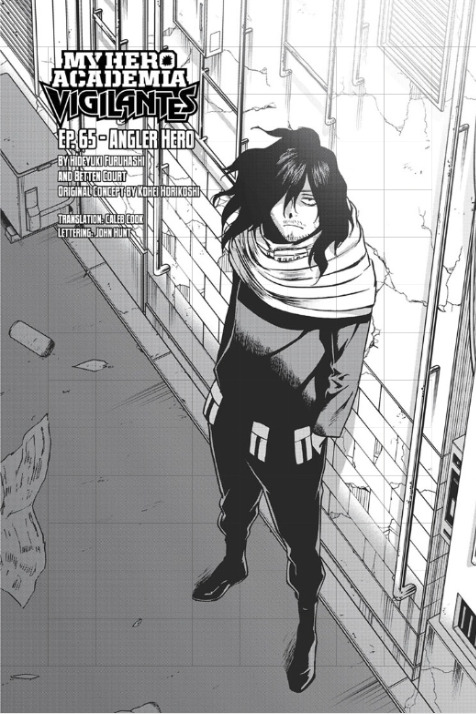
This chapter isn’t as action packed or as straightforward as the past chapters in showing sorrow. It’s more subtle and I think it’s artfully done because of it. It shows how a person can mourn over years and years and never mention anything about their pain through words, but through actions and decisions you know that they’re hurting. I think anyone who’s lost someone can find a little bit of themselves in how Aizawa (and to some extent, Mic) spent the years after Shirakumo T_T
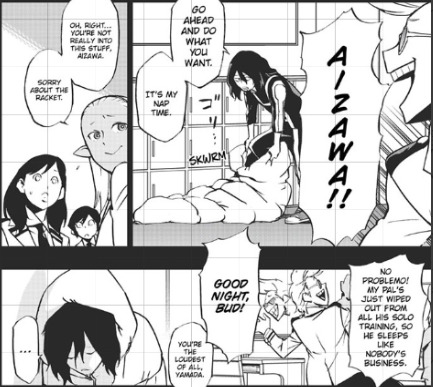
For example, we see the beginnings of cocoon!Aizawa, something that becomes a popular personality quirk he has. I don’t know about you, but I never thought that this mannerism of his that makes him so endearing to a lot of fans is actually related to him losing Shirakumo? That it’s actually something he does primarily to isolate himself from his (understanding) friends and classmates, and not just because he’s tired all the time. An attempt for him to comfort himself, in some ways, something that Mic accepts without question :(
It’s not a healthy coping mechanism, but people are allowed to grieve for as long as they want, right?
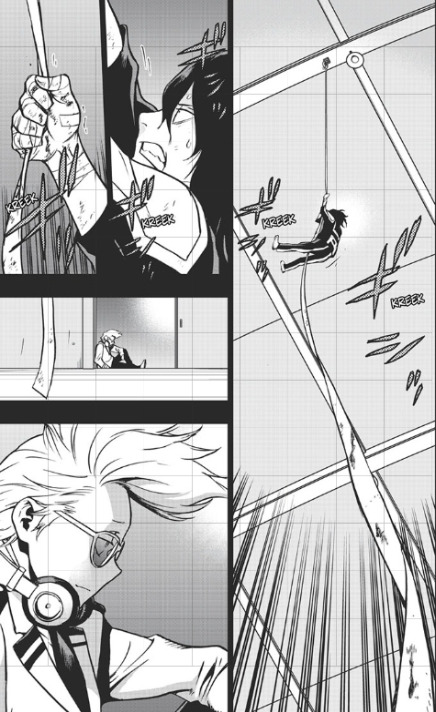
But Aizawa does this for the rest of his stay in UA. It’s implied that instead of opening himself up to others in his class, he works himself to the bone so he can be strong enough on his own. Mic is the only one patient enough to hang around him consistently throughout the years, but we see from his facial expression that watching Aizawa like this causes him a lot of pain too. :(
(I have extra appreciation for him as a person. Aizawa is really lucky to have someone like him who’s always there for him no matter what T_T)
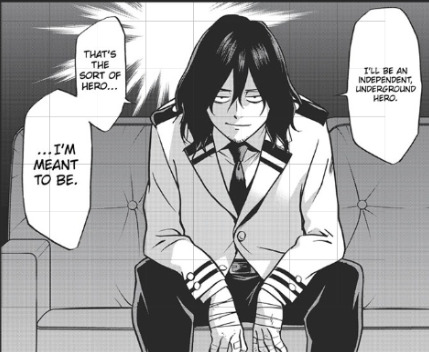
And now we see that his decision to become an underground hero who’ll function more as a bounty hunter than a standard pro-hero is really directly related to Shirakumo. To the credit of his homeroom teacher, they notice what’s happening with him pretty early but there’s nothing that they can do to change his mind :( Aizawa is resigned at this point to never work with anybody else, maybe because he can’t trust himself to take care of someone on the field being the way he is :(
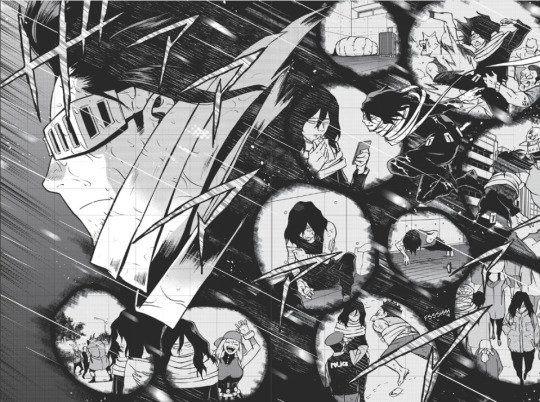
And we see that throughout the following years, he’s much the same--relying on nobody else but himself. On the day of graduation, he’s already in his hero costume and didn’t even stay behind for the groupshot :(
This is the typical work-yourself-to-the-bone-to-forget-the-pain sort of montage we’re bound to see in dramas. To his credit, Aizawa becomes a good hero, but we aren’t ever sure from his flashbacks if he’s ever happy with what he’s doing :(
I like these lil snippets of his life here, it really paints quite a picture. We see him passed out in an empty apartment, not bothering with a bed but instead his sleeping bed; relying on juice packs, like we see him do as 1-A’s homeroom teacher; training by himself, walking in the city by himself... there are only two pics I see that has him interacting with people who want to interact with him, and that’s the bit with Ms. Joke (who he blatantly ignores), and of Koichi and Knuckleduster from their first meeting in the manga, which is nothing but an accident. I might have just missed it, but I don’t see a trace of Midnight or Mic in these bubbles, so it implies that these past few years he’s blatantly ignored the few people in his life that he called his friends :(
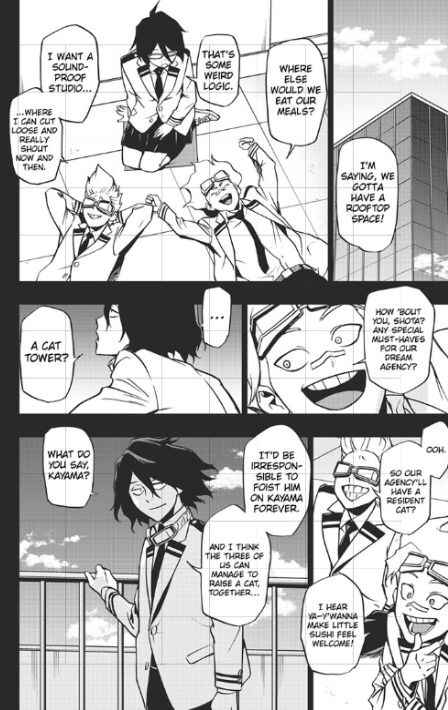
And this chapter is kinda cruel for showing us happier times again, because I think in the very heart of him, Aizawa really doesn’t want to be alone. :( That dream agency would have been so good, you guys. They were gonna live together and raise a cat together, ksadjfsajfa it sounds like a rom-com OT3 waiting to happen and instead we only have heartache and pain alskjfaslk;jfasl;fjsalkfjasfjkls this is so frustrating and sad T_T imagine what a different universe it could have been if Aizawa, Shirakumo, and Mic had that agency?! Really really different, 1-A woulda certainly been raised differently and Aizawa would have been brighter than he is right now. Well, only fic will tell.
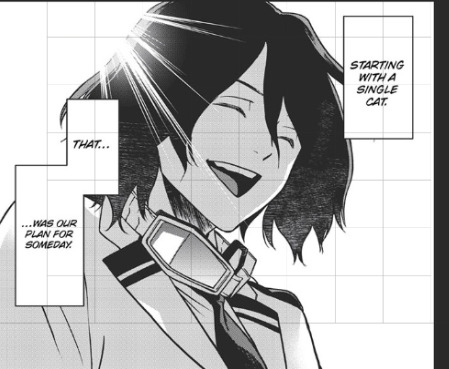
We could have seen Aizawa happy :(
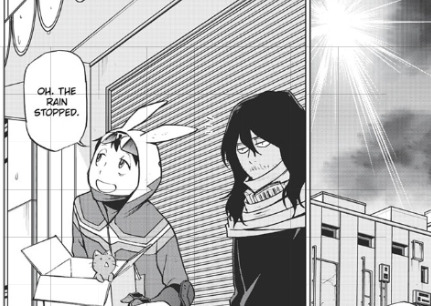
Well, the road to recovery is unpredictable. It always feels like forever, until it’s not, and all you can say about it is, oh, the rain’s stopped.
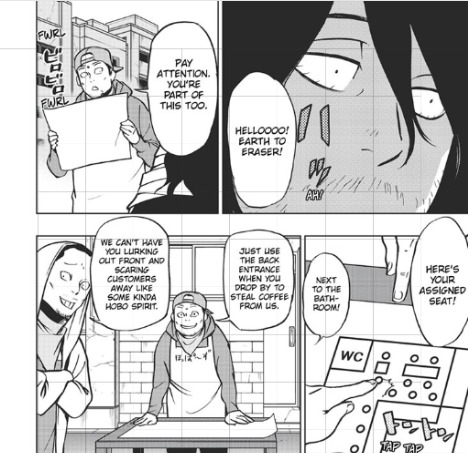
We’re shown Aizawa with his (first) foster kid and the cat, and we see cameos of the beloved Hotta guys again. I love that they’re actively involving Eraser in making plans for their new cafe when they were so begrudging at first to have him in his life. Eraser looks kind of surprised that he is, like “wait since when did i have friends again” when all he wanted was a place he could steal coffee from
Kudos to the Hotta dude for calling him a Hobo Spirit, because he has summarized the essence of Aizawa so succinctly
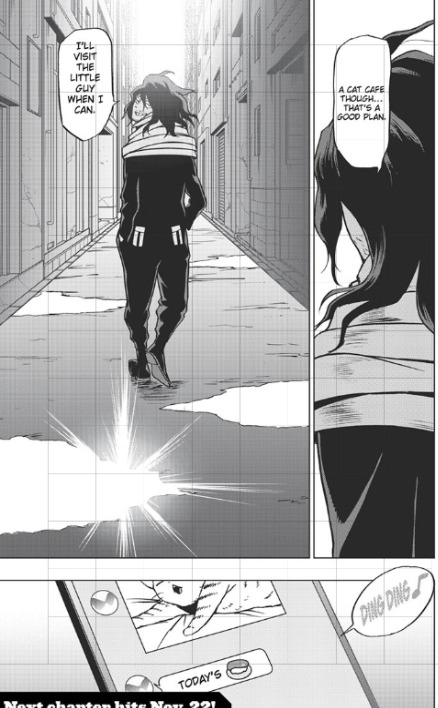
And it’s strange but it suddenly clicks with him that Aizawa doesn’t really need to be alone??? T_T Well, maybe it isn’t so much as a sudden click as something that he needs to constantly relearn by himself every day he works. We see that by the time he teaches the current 1-A that he still has his gloom and his tendency to solve things by himself, but he’s learning just as much as everyone else that we all need help too.
We see him pay attention to Midnight again--to her credit, she seems to be as patient as Mic is in handling his grief--and we see Today’s Sushi too T_T I suppose after this he finally agrees to be a teacher in UA and the rest is history
Agh... this is a lovely chapter all in all. It doesn’t answer our question about why this Aizawa arc is shown to us at this time though. Maybe it’s merely an explanation as to who Shirakumo is, because he’s mentioned in the main manga? Or maybe because we expect to see the effects of this event more in the future arcs or in the upcoming movie.??? I hope it’s the second one because I want to revisit this again, Aizawa is a great character and I want more stories about him T_T
But in Vigilantes, it’s time for a new arc!!! I wonder what’s gonna come up next! I can’t wait to see it!!!
#vigilantes spoilers#bnha spoilers#aizawa shouta#eraserhead#present mic#yamada hizashi#midnight#kayama nemuri#shirakumo oboro#loud cloud#sushi the cat#soft zawa#sadzawa#meta by juni#long post
622 notes
·
View notes
Text
Emotions / Dhawan!Master x reader
Summary: Since you’ve been feeling a bit depressed lately, The Master decides to surprise you.
Words: 1846
Warnings: Depression and anxiety issues, The Master being a bit out of character for fluff purposes.

Human emotions are complicated.
Well, in The Master’s eyes they have always been pathetic more than anything, but since you started travelling in his TARDIS he had somewhat reconsidered that. Not that he had changed his mind about your species – he would never see the human kind as something other than the insignificant subspecies they certainly were –, but he did see you differently.
Not that he would admit that out loud, of course, but he always noticed those little things that made you be you. Like the spark of joy that appeared in your eyes whenever you visited a new, undiscovered planet, or the little smile that came to your face when his TARDIS appeared unannounced in your front door to take you an adventure.
Slowly, he had grown to not only enjoy, but also love spending time with you as you proved yourself to be the perfect companion for him. The both of you were an odd pair since you were complete opposites, but you had managed to build your own place both in his TARDIS and in his life by always staying by his side and spending most of your time with him.
That’s why he was the first one to notice your change of behavior.
Most people in your life didn’t realize you were feeling down, and to be honest, you didn’t want them to. You tried as hard as you possibly could to make them see that everything was okay, not wanting to worry anybody. Everyone in your social circle seemed to buy your little act when you told them with a fake smile that everything was okay... But not The Master.
He started to notice your bad mood when he couldn’t find any sign of the usual enthusiasm that characterized you. With no explanation, you appeared in his TARDIS one day and, though you tried to act as you would usually do, he couldn’t see any of those small gestures he loved about you. Because even though you tried your best to ignore your feelings and even lie to yourself about them, there were some things you just couldn’t pretend.
The Master would have done anything to cheer his human pet up… The only problem was, he wasn’t exactly an expert in the control of his own emotions, so he surely had no idea on how to address yours. And since you weren’t exactly open to talk about what was going on either, he thought the best was not to bother you with unsolicited questions that could come out as noisy. Giving the situation a second thought and thinking that maybe he was overreacting, he decided to leave you to deal with your human issues on your own, hoping that you would start feeling better soon.
But with the passing of weeks and your lack of improvement it came to his realization that something serious was happening to you. You barely spent time at his TARDIS anymore, and when you did, you hardly could pretend to be interested in the places he took you too, nor tried to convince him not to execute his evil agenda like you used to do.
You were physically there with him, but your mind was somewhere else… That was enough to break both of his hearts. Because if there was something that mattered in the universe to the Time Lord anymore, that was you. And he wasn’t willing to lose his pet.
Usually, he let you spend a few days on Earth so you could rest after each adventure and keep your otherwise normal human life. It was an unwritten rule you had established when you had started travelling in his time machine. And according to that rule, you would have never expected to find him waiting for you outside your workplace when he had dropped you on your planet earlier that morning.
“Master…” You shyly approached him with a forced smile, trying to put up the front you had been using lately. Little did you know The Master had perfected the technique of pretending to be fine long before you and that he could see right through you. “I just got back a few hours ago, you must have gotten the date wrong…”
“There’s something I want to show you.” He replied in a very serious tone, offering you his hand for you to take.
Your gaze switched between the hand that he was offering and the intense stare he had set on you. Truth was you wanted nothing but to go home, lay on your bed and try to sleep for as long as you physically could, but you simply couldn’t say no to him. Much less when he looked at you like that. Barely being able to hold his deep gaze, you took his hand in yours, no farther questions asked.
Interlocking your fingers with his, he guided you inside his TARDIS, only letting go of you to set the controls in the console, but still making sure of keeping you close. You watched him maneuvering the levers and buttons as your anxious mind anticipated all the possible scenarios.
If The Master had appeared out of the blue saying that he wanted to show you something, should you be worried? His surprises usually involved destroying empires and overthrow thrones. But he wouldn’t have gone looking for you just to show you that. What if something bad had happened? Well, you had already seen chaos in all of its forms while travelling with him, so what could be something bad in the eyes of The Master? You stayed silent as all the negatives thoughts rambled in your head, causing you to not notice when the time machine landed.
Your distracted eyes turned their attention back to the Time Lord when he grabbed your hand again with surprising tenderness.
“Do you trust me?” His voice was soft when he asked, softer than you had ever heard it before. You slowly nodded your head as he placed his other hand on the other side of your face and caressed your cheek with his thumb. “Good.”
The Master gave you a smile before walking you out of the TARDIS. You were terrified of what could be at the other side of those doors, but you kept your body close to him in an attempt to put yourself together and face whatever was waiting for you.
It was not that you didn’t trust him, you did it blindly. You were totally positive that he wasn’t going to hurt you, but you also knew who he was and that the fact that he would never harm you didn’t mean he wouldn’t harm anyone else. Your best guess? He was about to show you the ruins of a civilization he had pulverized with his bare hands during the few hours you had been apart, the first step to whatever plan he had developed now to get The Doctor’s attention. You sighed at the thought of it, not being in the mood for any of his usual chaos, nor for anything for that matter.
Without letting go of you, The Master opened his TARDIS’s doors to show you the most beautiful night sky you had seen in your life. Looking up, you could see thousands of colored shooting stars travelling through the universe, illuminating the darkness of the galaxy and decorating it in the most fascinating way. Every star changed their color every few seconds, and as they danced around each other over darkness, you felt as if you were watching a living painting creating itself.
“How can they…?” You muttered, completely caught in the beauty of the scenery in front of you. The Master smiled when he saw a hint of that spark of light in your eyes that he had been missing.
“It’s the atmosphere of this planet.” He explained, slightly squeezing your hand. “The gasses in the air are extremely toxic to all forms of life, but they create this visual effect at night.”
You stayed silent as The Master, taking advantage of the disguise his TARDIS had taken as O’s house, took you to the front porch and sat with you on the stairs. Your eyes were completely fixated on the sky above, examining every pattern the celestial bodies formed.
For the first time in a while, you didn’t feel that stress and emptiness inside of you. There was no rush, no need to be productive or fill any standards. You could stay there, looking at the sky for as long as you wanted to, with The Master by your side grabbing your hand. The breathtaking vision in front of you got blurry when tears started to form in your your eyes.
The Master’s hand only left yours to cup your face between his palms and wipe away the first tears that started to fall down your cheeks.
“I’m sorry…” Not being able to hold his stare, you looked down, feeling somewhat stupid. You must have seemed stupid to him, you thought. He was one of the most dangerous criminals in the whole universe, and you had the nerve to simply sit there and cry in front of him because of your little human insecurities. How dumb of you…
“Don’t be, love. It’s okay.” He reassured you before taking you in his arms to hug you. Feeling his embrace, you hid your face in the crook of his neck and cried your heart out as he gently rubbed your back and ran his fingers through your hair. You had been suppressing your emotions for so long that they came out as an especially bitter cry, but once that you let it all out, you felt calmed and relived. It was really comforting to finally accept how you were feeling, but it was almost as important to know that you weren’t alone. He waited for your breathing to cool down to speak again. “I…”
The Master wanted to tell you that he was there for you, that he would destroy entire galaxies to prevent anyone from hurting you. He knew it wasn’t going to be that easy for you to get better, that you would need some time to recover and feel like yourself again. But he wanted to help you and be by your side like you had been for him since you had met him.
He couldn’t find the words to express that, but there was no need. You already knew all that.
“Thank you, Master.” You mumbled as you let go of him, still trying to catch your breathe as you cleaned your face with the back of your hand. “I really needed this.”
“Anytime.” He answered, taking your hand in his again, observing you as looked at the sky once more. “And I mean it.”
You smiled slightly and took a deep breathe. It was relieving to see that he could be sweet sometimes, and that he cared about you enough to show it. After leaving a kiss on his cheek, you rested your head on his shoulder.
“I know you do.”
#Dhawan!Master#Dhawan!Master x reader#Dhawan!Master x you#Sacha Dhawan#Doctor who#Dhawan!Master one shot#Dhawan!Master imagine#Dhawan Master#Dhawan Master x reader#Dhawan Master x you#Doctor Who imagine#The Master#Master x reader#Sacha Dhawan x reader#Sacha Dhawan x you
126 notes
·
View notes
Text
Mr. Universe Breakdown
I just had a lot of feelings about tonight’s episodes, so come with me while I attempt to process them.
Ice cream and pie for dinner is great, but you can kind of tell Steven is eating it more for his dad’s sake than his own.
The entire "Dear Old Dad" callback is so sweet, imma cry.
I love how Steven is this nearly adult drool-snoring with his mouth wide open in Greg's van and Greg still looks at him like he's the cutest child ever.
Alright, this expression with that weak laugh was the first hint we get that Steven is not totally into this. He's trying, but it's getting wearing.
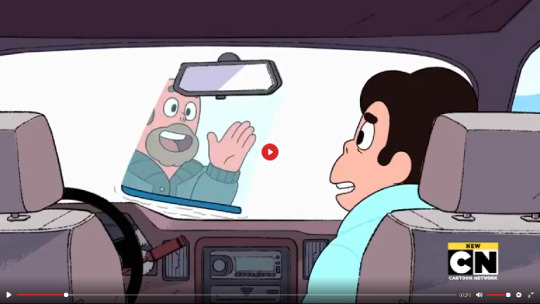
Trying on tacky convenience store sunglasses and Greg noping out of the bathroom were peak moments.
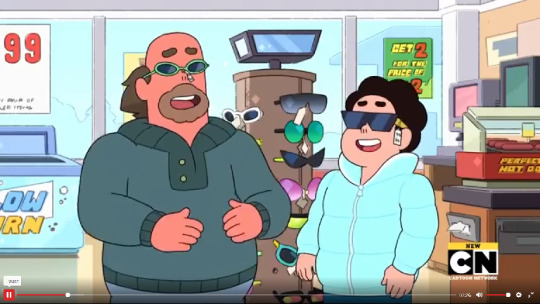
Matching icons, anyone??
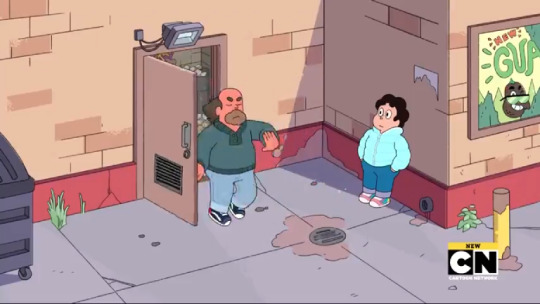
Greg, you live in a van, how are your standards that high?
Also, I wasn’t expecting Guacola to have a callback. No redemption arc for that abomination of a beverage.
“Dad, you’re rich, you don’t have to steal!”
I love how Steven just immediately assumes his dad is taking him to steal stuff. I’m doing this react on my second watch through, but I immediately knew this was the house Greg grew up in.
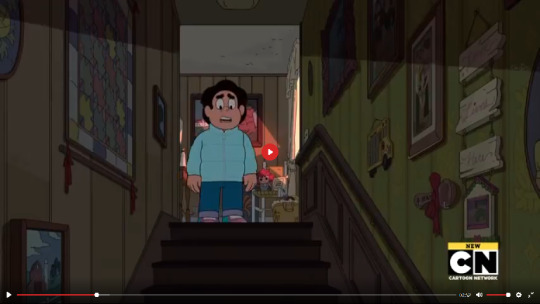
There’s a picture of the barn in the hallway! And a “Love Lives Here” sign. Oh no, is that this Universe’s equivalent to “Live, Laugh, Love?” Here I thought Greg avoided his parents because they were toxic or abusive, but it turns out they’re probably just super lame and cramped his style.
“Sorry for breaking into your lovely home. You seem like such nice people, with excellent tastes.”
First watch through, I totally thought this was a sarcastic little teen snark comment. Because come on. This decor is the quintessential representation of dated-grandparent-mild-hoarder-chic. On my second watch through, this seems utterly genuine. This house represents a peaceful, happy, stable life that Steven’s never known, and that he thinks he never will. He has so much longing to take in every single detail, before he even knows the people who live in that house are related to him. I had to take a break after writing that sentence because I got emotional.
He is more than strong enough to forcibly stop his dad from “stealing,” or to demand an explanation from him, but instead he goes off to write an “i’m srry we broke into ur house lol” note. Seems like he wanted a justifiable reason to explore this house.
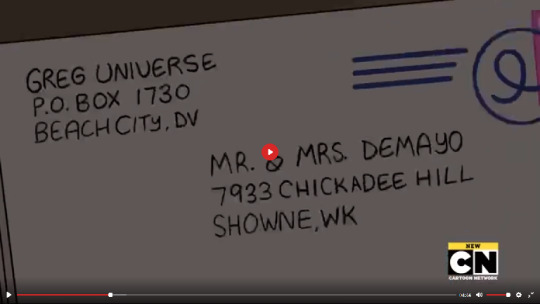
Steven thinks later in the ep that Greg rejected a perfect life, but why would the parents not open any of Greg’s letters? Do they know about Steven? Do they care? It seems like they would care quite a bit, given that all of Greg’s memories have been preserved throughout the house, and yet no pictures of Steven, which tells me they don’t know about him. It’s not lost on me that Greg uses a PO box so they can’t find him (also because he still lives in a van). Is Greg repeatedly sending them checks so he feels he doesn’t owe them anything, and they are just refusing to cash them? I have so many questions.
Alright, so Steven is SO EXCITED to see Greg’s childhood memories. So excited to see his roots. To see his own connection to his human heritage. And Greg just shuts it down.
Way back in “Gem Harvest,” Greg saw how desperate Steven was to make a relationship with Uncle Andy work. And yet Greg did nothing to expose him to other human relatives.
In his attempt to grant Steven “freedom,” he just bound him and lived through him in a different way than his own parents did. If Steven’s upbringing was really about freedom more than Greg projecting his own issues, then Steven would have been given the option to have grandparents in his life. He would have gotten to decide if he liked meatloaf every Thursday and been given the chance to take road trips to their warm, lived in little house. It is a huge, glaring mistake that Greg never gave Steven that chance, especially after seeing how much he loved Andy.
“Leave that junk behind.”
Greg found the one memory he was looking for, and paid no attention to what Steven was drawn to.
“I get it, Steven. When I was just little Gregory Demayo I was going through the motions. Doing what everybody else wanted.”
And yet that’s exactly what he’s having Steven do. He’s literally having Steven walk in his footsteps to find himself in the same way he did, and he’s so lost in his own nostalgia that he’s not understanding that the reason that path worked for him was because he chose it. Steven’s way of breaking free and finding himself might end up being horribly boring and domestic to Greg, since that was something he never knew growing up.
This song is pretty tight, but Steven is not feeling it. Read the room, Greg. It’s like that “who wants to go a ROAAAAD TRIPPP??” line all over again.
“I don’t need this song, I need what you had...they can’t have been worse than mom’s family. I went half way across the galaxy for them, and THIS was right here??”
PREACH, Steven! He has always been so desperate for family. I’m getting so frustrated with Greg for denying him that choice because of his own hangups with authority figures.
Steven: You’re just like mom!
Greg: You grew up with actual freedom!
Steven: I grew up in a van!
Oh geez, stuff is about to go down. The leak did not prepare me for this moment.
“My problem isn’t that I’m a gem! My problem is that I’m a UNIVERSE!”
And here we see Steven shift from blaming his mom for everything, to blaming his dad for everything. And it’s so cathartic, honestly. It’s hard to be mad at Greg because he’s just so sweet and gentle, and rarely gets angry back at someone even when they are angry at him. And he genuinely loves the crap out of Steven. Even with all that, however, he is not blameless. And Steven has a right to call him out on that.
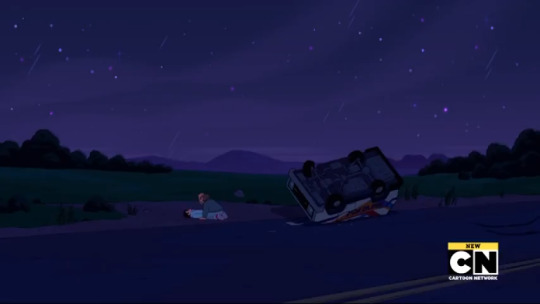
Scene breakdown: The driver’s side is totally crushed. The impact is enough that Steven was unconscious while Greg pulled him out of the car, and while he called for a tow truck. Think of all the impacts Steven hasn’t been knocked unconscious for, including all those hits from Jasper in the very next episode. If he was a normal human, Steven would have died on impact here. His gem probably was working overtime rapidly healing multiple fractures and internal bleeding in his brain.
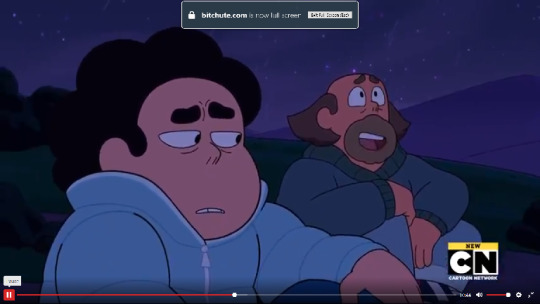
And here’s where Steven starts to tune Greg out. I can’t help but see a parallel to when Aquamarine/Bluebird gets so annoyed with Steven’s relentless positivity.
I guess the talent of delivering all those cheesy motivational pep talks came from Greg. You know what, though? Forced positivity is just widening the divide between them at this point. Steven is not in a positive place right now, and he did his best to express why, but instead of owning up to anything Greg is just chalking it up to him “going through a hard time right now.” On the surface he appears sympathetic, but his response is ultimately condescending and invalidating.
And in the background he just talks about eating ice cream for more meals, like that’s going to fix everything. Like Steven didn’t just tell him that was the opposite of what he needed.
Even at this moment Greg never offers to connect him with his human family, when Steven has very clearly stated that’s what he wants.
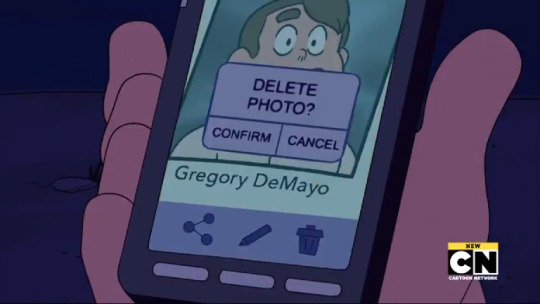
I never would have thought a simple scene deleting a photo would be so tense. The building music, continuing to make Greg seem further away. The tired, bitter look in Steven’s eyes. This is like a villain origin story wtf.
Steven is slowly running out of people who he feels he can connect with. At the start of SUF it was the gems, and then it was Connie, and now it’s Greg. With that deleted photo he’s decided that Greg is no longer worth confiding in. He’s just another person who won’t listen.
I thought this scene would be the most painful one I saw tonight, until I saw Fragments...
74 notes
·
View notes
Text
The Real Story Behind The Babadook (2014), And 17 Weirdest Bogeymen From Around The World That Might Be Hiding Under Your Bed Right Now
Strange times we live in.
It’s a Saturday night, and I’m hauled up at home eating a vegetarian lasagne whilst my mother asks me for the 37th time why I’ve decided to give up meat, when really, if there was no global pandemic, I’d be hauled up at home eating a vegetarian lasagne whilst my mother asks me for the 37th time why I’ve decided to give up meat.
It really is a strange time we live in.
But, in my attempt to protect the vulnerable groups in society and halt the spread of the latest Twitter hashtag in its tracks, I decided to catch up on the horror films hadn’t found the time to press play on just yet.
So, a bucket of popcorn and some mild trauma later, I could finally join in the conversation about The Babadook.
6 years too late.
Nevertheless! Once I’d emotionally recovered, I finally had my Sex And The City moment. No, not the ones with feminism that would make Emilline Pankhurst perform the equivalent of a Viennese Waltz in her grave - the one where Carrie sits in her NYC apartment and thinks about men at her computer.
“I couldn’t help but wonder: could the Babadook be based on a true story? ”

Unfortunately, I discovered that the Babadook is based on the concept of the boogeyman, an urban legend that has a greater global reach than Covid-19.
So, to distract you from the global pandemic with the threat of a creature lurking under your bed and waiting to snatch an ankle, I thought I’d let you in on the reality behind this queer icon.
First, let’s talk ‘bout The Babadook.
It was one of the biggest hits of the 2010s, combining the classic trope of creepy children with the classic colour palette of depression. Our story follows a single mother and her son who begins to be visited by an imaginary creature fresh from the pages of a children’s book.
With spiky talon-like hands, a cloaked figure, a jaw crammed full of teeth, a face paler than that time you bought that foundation on a whim in TK Maxx - all crowned with a dusty hat - the Babadook the child was seeing certainly had a sense of style.
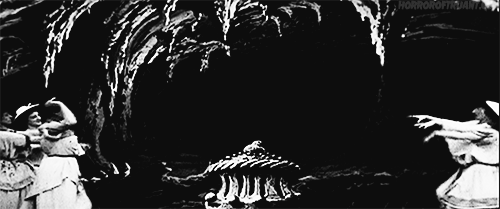
The child, Sam, begins to create intricate traps and weapons designed to stop the Babadook, all the while the book predicts the mother’s rather dark future. It becomes clear that the Bababook is preying on the mother and essentially possessing her, a diagnosis that is confirmed when the mother attempts to kill Sam.
She then regurgitates a black inky substance evocative of ectoplasm, and is released from its grip.
The film ends on the happy family feeding the Babadook as it lives in their basement.
This indie horror - once it had finished polishing the 5 awards on it’s mantelpiece - might have woven a intricate plot deviating from the simple basis of international man of mystery James Bond The Boogeyman, but the basis still sticks out more than that wardrobe in the corner of your bedroom you’re now highly conscious of.
Simply put, the Babadook matches the basic concept of the boogeyman:
There’s some weird, dark creature that knicks kids and eats ‘em if they wander alone or don’t go to bed or misbehave. Just like Krampus, the bogeyman is a legend propagated by parents to convince kids to stay in line.
That being said, the mythical creature isn’t the only inspo behind this cinema-hit.
Specifically, the brains behind the film, Jennifer Kent, claimed it was about a deep-rooted fear we all have: that of going mad. On top of this, it seeks to show parenting from a real perspective.
The film focuses on a single mother as she faces one of the most difficult challenges in life: she loses her husband whilst going to give birth to her son, and then has to raise him alone. But that is not all.
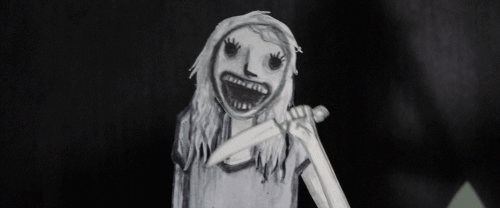
Kent also spoke of a real encounter with the bogeyman.
Basics, her bestie’s son was being plagued by an imaginary monster, so she pretended to talk to it to calm his concerns. Sure, this tale might not have kickstarted the real terror engaged with in this movie, but it invited us into the reality behind the bogeyman.
But beyond this, the movie also detracts from the Babadook, and instead looks for the primal instincts in the mother - it looks for the bogeyman within us all.
That’s right - the real horror that was inside us all along.
Yawn.
But the thing is, it also brings up hell of a lot of paranormal activity that is remarkably accurate to theories of the supernatural.
Let’s start with the introduction of the Babadook.
He arrives in the form of a creepy children’s book no one’s seen or heard of. Armed with a chilling nursery rhyme and an aesthetic last seen in 2007, the Babadook follows the basic principles of a basic haunting: ghost does spooky stuff, ghost spooks humans, humans invite it in following the consent laws of the universe by interacting with it, ghost spooky powers intensify.
This begins with the book itself. Although the film doesn’t consider if he is a paranormal being aligning with the concept of demons and spirits (etc.), this book follows the concept of haunted objects.
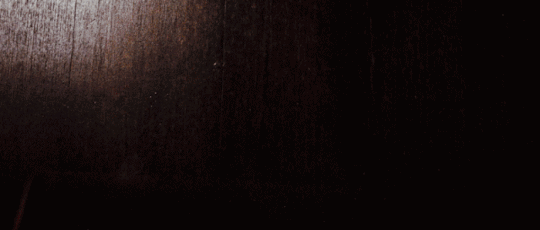
By opening the book and reading it - or, interacting with it - they invite in the Babadook. And when she tries to destroy it, it crops up again, fully intact and conveniently lying on her doorstep.
No ‘sorry we missed you card’ needed.
This closely follows the theory of the haunted object, something more on-trend than tutting at empty shelves in the grocery store. Haunted objects have a habit of failing to be destroyed, and by engaging with them, such as not asking permission for taking a picture of a haunted doll, you enter communication with them.
From there, you’ve basically consented to a full possession. The object is a vessel for a spirit or a demon until a new, better, breathing vessel can be found.
You can find out more about this here.
I can’t find anything about haunted books specifically online, but as a variety of haunted objects exist, from bunk beds to boxes, I’m sure there’s potential for it.
Next is the eventual possession of the mother.
One of the most dramatic moments we witness is when the mother coughs up this black bile which represents the removal of the Babadook. This bears a striking resemblance to ectoplasm, a white liquid often released by those experiencing intense paranormal activity.
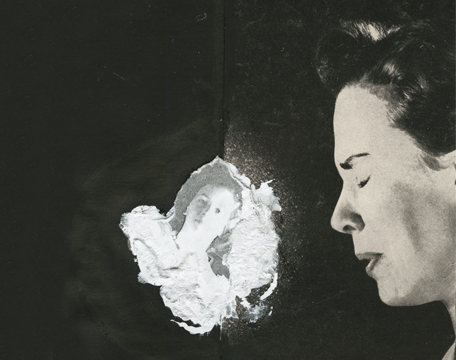
When mediums experience a trance-like state, they supposedly release a fabric-like or thick substance that darkens as physic energy is intensified. It allows those in the supernatural realm to interact with the physical realm, and for spirits to represent themselves to the audience of a seance.
This film was one of the first to explore the potential paranormal explanations behind the bogeyman, and give some basis to a beast that has haunted communities since the beginning of time.
Speaking of the beast…
Who is the bogeyman?
It’s sometime in the 1500s.
We are in the middle of a small country called England, struggling to make ends meet between the near constant famine, the anxiety of being cursed by a witch, or some war with [insert european nation that may or may not exist anymore].
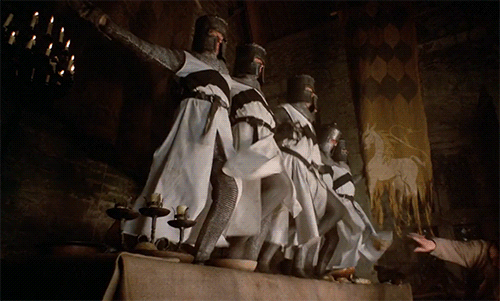
Either way, when we aren’t trying to spell everything with an ‘e’ at the end, we are being taunted by hobgoblins.
These pesky beasts made their name in tormenting Englishmen, playing pranks on them or simply just being foul.
Hobgoblins are the OG bogeymen, or are the first we can trace back to recorded sources. But they were no means the last. And they were by no means the only ones in the world.
As a simple definition, the bogeyman is a mythical creature that makes sure kids are staying in line, and was made up by parents. The thing is, the bogeyman features in every culture that has ever been created.
And given the realm of the paranormal explored so far on this blog, perhaps your local Babadook isn’t so out of the question.

The bogeyman has always claimed a rather vague existence, representing a non-specific terror that has even extended to just ‘being the devil’ in some cases. The origins of the name are no different: ‘bogge’ comes from middle english, meaning ‘something frightening’ or ‘scarecrow’.
It has even been interpreted to mean ‘goat’ which can be traced to relations to the devil.
Appearance wise, the bogeyman has several broad features that stretch across cultures. Standard features include sharp teeth, talon or claw-like hands, hooves for feet, and even bug-like features. The Babadook might have shared in a few of these #basic-bogeyman traits, but it’s not all about looks.
How does his personality fair?
The bogeyman can pick between three personality types: something that punishes misbehaving children; one that is just violent for the hell of it which includes stealing kids, and eating them and/or taking them back to hell; or one that protects the innocent.
“So what you’re saying is, this is a vague looking creature with a vague personality with vague ambitions that is made up by parents who are tired of their kids interrupting their vague post-marital sex?”
Okay, fine, the bogeyman bears little resemblance to the basic concept of the bogeyman. But this is what makes him the international man of mystery. It’s the regional divergences between each nation’s own Babadook that makes this creature quite so peculiar.
You see, I assumed the bogeyman would be a universal concept draped in more black clothes than a kid that was in the throes of that scene where Edward leaves Bella.
Turns out that there’s actually a band of bogeymen which can be specified by their not-so-casual racism and genitalia.
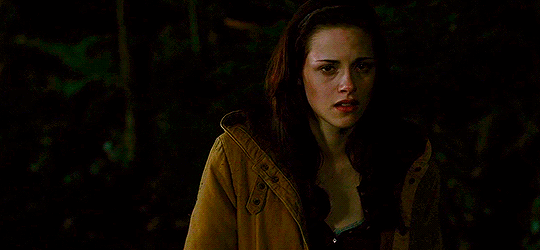
But as the 195 countries dotted across the globe have fostered their own child-eating monster, I thought I’d cut to the chase and fill you in on the world’s weirdest bogeymen.
*Rolls up sleeves of Team Edward hoodie*
The Sack Man
Making his cinematic debut in The Nightmare Before Christmas, the Sack Man is the international symbol for the bogeyman. Whether he himself is draped in sack-like materials, or is lugging one around with him, Hombre Del Saco uses his luggage to capture and carry naughty children away to, uh, somewhere.
Most popular in Latin countries and Eastern Europe, the Sack Man is the most well travelled bogeyman on this list.
Babaroga
The original inspiration behind the Babadook - note the similar name - Babaroga is a resident of Serbia and its neighbouring countries. However, the mood board for the Babadook’s inspiration stopped there.
Babaroga literally translates to “old woman with horns”.
And this pensioner spends her time finding children, putting them in a sack (how original), bringing them to her cave, and eating them. Or, to shake things up, she pulls childrens through small holes in the ceiling.
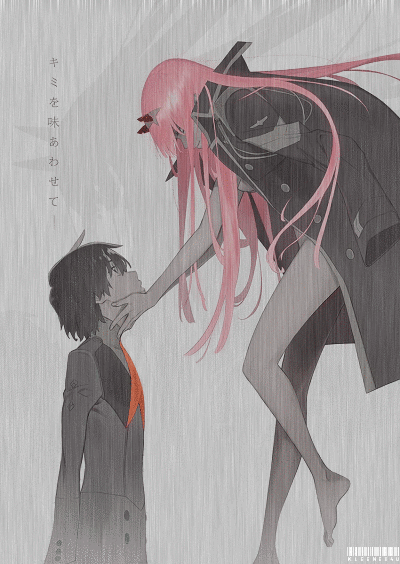
El Coco
When he’s not featuring in lovable Disney hits, El Coco is snatching kids that don’t get to sleep when they should. With nursery rhymes detailing the legend - a chilling similarity to the Babadook - spanish-language countries across the globe are versed in reportedly seeing a coconut-like face hiding under their beds.
With a brown hairy face and body, and glowing red eyes to match, this famous humanoid might be closer than you think.
“Que viene el Coco y te comerá”
- A line from the traditional Spanish nursery rhyme.
The Mamma
Pakistan gets its fair share of attention on the news cycle, but aside from the war going on, no one has ever noted the rather peculiar beast haunting the nation’s young women.
The Mamma isn’t the mothering being the name suggests, but is a large ape that lives in the mountains and only comes to the civilised world when in need of a young girl. Once he’s kidnapped ‘em and taken ‘em back to his cave, he licks their hands and feet so they can’t escape.
I have a strong feeling that what happens next to these innocent women isn’t as silly as someone licking your feet.
La Tulievieja
Bringing together the award-winning aesthetic of The Ring and the naseau-inducing aesthetic of Cats, La Tulievieja is Panama’s warning for naughty children. Legend has it she is a spirit cursed by God for drowning her child.
The thing is, God’s curse was, uh, confused. Her monstrous form consists of acne scarring, long hair, claws for hands, a cat’s body and a farmyard animal’s hooved feet. On top of that, she also looks like the child she drowned.
Yep, confused.
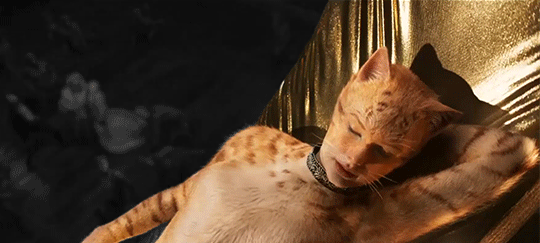
The Jersey Devil
Most countries suffer from multiple bogeymen - here in the UK, for example, we have 12 varieties - and America is no different. The Jersey Devil is actually one of 4 variants, and, like La Tulievieja, is also confused.
Fresh from the jaws of New Jersey, this beast has a horse’s head, bat wings, hooves, and a snake’s tail. First spotted in the 18th century and then again in 1909, it is believed that this legend was actually manufactured as a real estate hoax to coax residents into lowering their selling prices.
You might be able to deny the existence of this beast, but the Cipelahq (a large owl), the Long Black Being that makes a habit of slithering round like a snake, and Bloody Bones (a dancing skeleton and a separate skull) have yet to be disproven.
The Copperpenis Owl
Hungary has 3 different bogeyman, and most fit the description of the international beast: there’s one with a sack, there’s one which is just a-bit-beasty, and then there’s the giant owl with a penis made of copper.
I personally feel a Babadook with rose gold genitalia circa 2013 might have detracted from the overall feel of the film.

Ijiraq and the Qalupalik
Iniut communities also follow beliefs in the bogeyman, and probably focus on them more than others because if you wander off in the Arctic you will either get mauled by a bear and die, or freeze.
And then you’ll die.
They actually have 2 resident bogeymen. There’s the Ijiraq, a shapeshifter that kidnaps kids. You know, pretty basic bitch stuff. And then there’s the Qalupalik who is slightly more spooky.
This is a mermaid laden with green skin, long fingernails, and ratty hair that carry babies away in amauti (pouches or sacks for carrying kids) and bring them to live in their underwater world.
Butzemann
Remember when I mentioned that thing about casual racism? It’s a bit of grey area, ironically.
Germany’s very own bogeyman is known as The Black Man.
(You can see my point.)
That being said, this probably doesn’t actually refer to the colour of his skin as most Germans during the Middle Ages hadn’t actually seen anyone from the African continent. Instead, his outdated nickname was actually down to his preference for dark corners.
The closet, under the bed, in forests during the early hours... If it’s spooky, you’ll find him here.
Babau
Germany isn’t the only country with politically incorrect bogeyman. Italy has its very own Black Man, a mysterious figure which often features as a black man (gasp) or a black ghost. Only this entity has no legs.
The Marabbecca on the other hand is specific to Sicily, and mirrors the mythology of the Inuits.
Don’t play too close to the water, kids, or a Marabbecca will swim up and drag you to your watery grave!
The Kropeman
Our final iconic bogeyman isn’t like the other girls, even if his fellow Luxembourgian monsters are. There’s yet another Black Man, and there’s something about an uncle, but it's the Kropeman which has me sleeping with the lights on.
Under the streets of this small country roams a man with a long hook.
When he’s not busy dodging rats in the sewers, he’s grabbing kids by their nose via the hook, and dragging ‘em down into the storm drains.
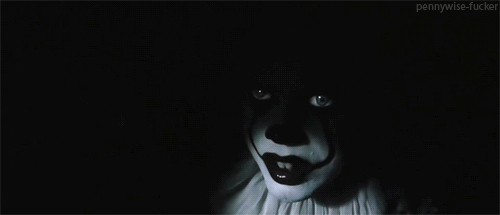
So - which one is hiding in your closet?
(Aside from the queerness your inner 14 year old hasn’t fully unleashed yet like a big bisexual dragon spewing flames of gender-neutralness.)
(Don’t worry, I’m fine.)
Are you a whore for horror? Passionate about the paranormal? Do you want to see a new real ghost story every day? Then you have to follow this blog.
Read this post next!
#babadook#babadook book#haunted book#babadook 2#babadook meaning#babadook monster#based on true story#based on a true story#based on real events#horror#horror film#a quiet place#Horror Movies#the grudge#the conjuring#scary movie#horror movies 2019#horror movies 2014#candyman#the conjuring 2#bogeyman#bogeyman meaning#boogeyman#urban legend#mythical creatures#vampires#werewolves#witches#paranormal evidence#photographic evidence of ghosts
18 notes
·
View notes
Text
I was asked recently: do you enjoy writing for ll as much as you do for Felicity? You write Felicity like you can hear her thoughts. But then you go and write ll’s character and you manage to keep her IN character without making her bitchy and without pulling her to bits. Do you like writing for her?
Beyond being hugely flattered – SO FLATTERED, MY GOODNESS – and mildly sceptical – I’ve never thought I was anything special in terms of writing ability but I do love keeping characters IN character whilst placing them in new situations – I can answer with complete confidence that, yes. I like writing for LL’s character.
I like knowing just how skewed her perception is. I enjoy writing that perception because in many ways, it’s incredibly indulgent. In reality, no one who wants to be loved and who wants a family should think like LL does. It’s a point of view that’s singular and therefore, interesting. But after writing for her, I truly don’t think the writers knew what to do with their creation, and she was a creation. Just because her name is LL doesn’t make her any less of a creation than Sara. Comic LL? Well, she’s married to a cop; ergo the name Lance. This cop is abusive. Her personality is also very different and she isn’t a lawyer. The writers tried very hard to make LL morally perfect but destroyed it when they realised she’d have to compromise said morals to love Oliver. So they gave her a set of standards that no one could reach and yet had her break them every time Oliver was mentioned. However instead of showing real guilt or shame or SOMETHING that would enable her some character progression, they replaced it wit superiority. It made her a selfish character who were supposed to believe is the opposite.
But you see, well written characters – characters with substance, who aren’t there for a plot purpose but as a defined personality on a show – can be selfless and still do selfish things. They can compromise their integrity and still be morally righteous. They can be good and yet see the virtue in violence.
I give thee Felicity Smoak.
Now KC did her own damage to LL in S1 – she was very determined to make her into something she wasn’t too fast because she clearly believed this show had been created to turn her into a mask wielding superhero who’s better than everyone. But the writers are the main problem – them and the exec’s at CW who threw an actress at the show because she had a contract with them. She was SO not right for the character, but they didn’t care. She’d starred in Supernatural so her name had merit.
(just a hypothetical: if Emily had been cast as LL, would she have possessed the skill to portray the character in a way that could make us like her? I think so, though the writers made this obscenely hard with their contradictory writing. Most would have a lot of difficulty. Still, I’m almost certain that if she HAD been, Oliver would have married the BC: a BC a foot shorter with pretty blue eyes… you know like in the comics *eye roll* Her COMIC BOOK fans ignore even the comic book details.)
ANYWAY!
It’s kind of fascinating really: I made sure to watch the episodes and ingest everything about the characters I write. I don’t always do this and it’s been a while so it’s time for a re-watch (any excuse really) but a few things became incredibly clear once I started. I have a few of Felicity’s habits: I talk to myself in tangents of weirdness and get flustered/blush super easily. I’m not a genius by any definition (mostly I'm a gigantic dumbass) but I wear glasses with my hair in a ponytail and I’m not generally the first person seen in a crowded room so to speak, plus I overthink/second guess everything I say. Like Oliver, I blame myself for everything and worry too much. I’m more solitary than most. I want to save everyone but have no idea how to. I love deeply.
I don’t love easily.
I’m not like Olicity. But when I write, I sort of become them. Or I attempt to. I feel my way through each scene and it becomes quite personal, which would explain the sentence breaks where I intermingle thought and movement with descriptions and speech.
Then I started writing for ll… now, I like to remain unbiased when I analyse a character. I don’t like ll. I don’t appreciate the way she was written in any season – I’m referring to E1 LL, E2 I’ll talk about later – nor did I enjoy KC’s horrific portrayal. It’s no secret, but that doesn’t mean I can’t be fair to her character.
I came up with three literary explanations of her character and this is one of them: the medium between the other two, from ll's point of view (please remember I am at work and therefore cannot write as well as I would like) -
She’s ordinary. Totally ordinary. A normal person who lives, works, eats, sleeps. We can empathise.
She’s part of a nuclear family and she knows her family loves her. She loves them. They’re not a perfect family but they are a good one.
She has an over exaggerated sense of how attractive and intelligent she is, exacerbated by how many people have told her that she’s smart and beautiful. She knows because she’s been told: she’s never questioned her looks or her intelligence and it’s the start of all the bad really. It was reinforced by becoming friends with the two richest kids in the city.
So she’s never had a reason to doubt herself. Not ever. There’s nothing in the world that ever could.
As for how this affects the story:
Through illogical and extremely unlikely circumstances – never explained for two reasons: it wasn’t important enough to the writers and they wrote themselves into many a corner with ll’s character as they tried to fit her into a universe that didn’t want to house their forced creation – she became good friends with Tommy Merlyn and Oliver Queen.
Oliver Queen makes her do the one thing she’s never done: doubt herself.
Surely she’s pretty enough for him to choose her. Smart enough. Good enough. Strong enough. Enough. She’s ENOUGH for him. They fit each other. He’s the Romeo to her Juliette. She’s aiming high and look, he’s right there: her partner along the way to the top. Her partner and her WAY. Her financer. Her ego boost. Her meal ticket. Her proof that she’s ENOUGH. Her proof that she’s relevant. That she’s BETTER-
THAN. HER. SISTER.
Because, gosh: LL’s world is dictated, her entire sense of self validated, by the existence of Sara Lance. I kid you not. I found this in the show… and it should make you feel sympathy for her. Should make you care. But she destroys our ability to give a crap because of how she handles everything with her sister.
Sara, who is daddy’s girl.
Sara who Oliver keeps leering over and not the older, better sister.
Sara who her mother sides with all the time.
Sara with the multitude of friends.
Sara with the better body.
Sara. Sara. Sara.
Why? Laurel does everything right: she follows the rules, does as she’s told, has become the role model. How does Sara keep BEATING her?
Is it… because Sara takes what she wants and gets away with it? She takes other people’s boyfriends - Laurel’s seen her do this (Arrow S1.5 comics) - she swindles her father for more allowance, her mother gives her free reign over the phone line… she’s selfish.
Well then, so shall LL be.
Suddenly Sara’s grounded-
And it WAS the right thing to do, Sara was too young and she didn’t want her heralded as a slut so soon. Ollie wouldn’t want anything to do with her anyway, but the way she throws herself at him is embarrassing, right?
-And the ‘Ollie Express’ is open season. He says yes. They have sex. Now she has him. She’s wanted by Ollie Queen and he’s settling down for HER. No one else and certainly not Sara. She’s beaten Sara and she’s assured a future for herself. His mother adores her. She fits in.
She can breathe freely again.
And Oliver, he’s so much more than people think: he’s sweet and kind- so what if he’s not that smart, she’s smart enough for the both of them. He’s reliable and honest. He makes her feels beautiful and wanted. All is right in the world. No matter what happens, she’ll always be the one who became Oliver’s first real girlfriend, because she’s special to him. She’s SPECIAL. She’s what he-
Except he’s having an affair behind her back.
With Sara.
Sara who she’d beaten.
Sara who isn’t as smart or as pretty or as EVERYTHING as LL.
Sara who’d gotten on a boat with her boyfriend.
She’s humiliated, but more than that… she’s confused. It’s nonsensical.
She’s everything. She’s perfect. She’s the ONE so… Oliver was happy. He was ready to move forwards with her. Why did he do this? Why does Sara keep beating her? She’s BETTER than Sara.
She’s better than all of them.
If they can't see that, see her... then why do they matter?
And then the realisation: she’s hard done to. She’s the scorned woman. She’s the one betrayed. She’s the one who’s grieving. She’s the one who deals with it in the best way. She’s the one who’ll walk out of this on top.
Oliver and Sara lost at sea? That’s nothing. NOTHING. She’s the one who got hurt and she never deserved it. They should have respected her. Should have loved her more. Ollie deserved to die at sea.
And so… an impetus is born: it generates into an unbreakable mind-set, separated from reality, one that we have to put up with until she dies. Literally.
Narcissism. It’s almost a disorder.
And it’s in the most impossible form: she sets a deliberately high standard for the world to attempt to reach and she gets to watch from up high as everyone tries to touch her seat. A standard that everyone must follow EXCEPT her. If anyone fails to meet it for whatever reason (and they always do), then they fail her expectations and therefore they fail her (this was admitted by KC herself, just fyi). They’re no longer good enough.
But she is though. She’s the ONLY one good enough. She loves her family, but she’s better than them. They’re all liars and stealers and selfish – Sara – betrayers – mom – neglecters – dad – cheaters and disappointments – Ollie – and unworthy – Tommy.
She doesn’t need them, not ever. How could she when she’s better? How could they ever meet her wavelength? How could they ever understand her mission, her heart, when they can’t meet her at the top?
But then her father, who can’t appreciate her because he isn’t capable of seeing her the way he should, makes her feel GUILT about her choice to be a DA.
Uh oh. Suddenly; she doesn’t sound righteous. She sounds like she’s becoming a lawyer for money-
NO. no, LL doesn’t do that, right? She’s better, so she can’t. She can’t fall beneath her FATHER’S set of standards because her own are so much better and she doesn’t have to meet her own because they’re for everyone else on the planet who are undeserving and have yet to face her justice. No one can outrun her justice, her standards.
Except herself.
But her father’s seen something in her, something twisted. The call of money and power and status and it’s a filthy thing isn’t it? Greed. Lust. Covetous.
She becomes the expert at coveting what others have, even as she judges them.
But she has to hide the filth: she’s better than her demons because she judges even them. Her father knows nothing. He doesn’t see her, so how could he? She’ll help him see her.
She joins CNRI to prove him wrong. She’s the pure one again whilst her father’s the alcoholic who can’t get over the daughter who left instead of adoring the daughter who stayed. The daughter who fights.
She sleeps with Tommy because she can, because she’s needy, because he’s Ollie’s best friend; the closest thing to the man she loves and hates and no one need ever know the notch she tied that night to her bed post.
Ollie did it with Sara after all. He could have had the bed post instead of just the notch. He died before he could realise that.
But it happens again and again for months and she has to admit, it’s thrilling aiming down. Obeying an urge for once and she needs the release: getting a job with CNRI immediately after law school instead of the requisite two years in a firm is impossible, but not for LL. Still, it’s tiring and it feels unrewarding, which is why she also needs the ego boost. She needs the validation, that it isn't all for nothing.
This way, she’s both fucking her past goodbye and giving it the finger.
She stops once she gets the job. Stepping stones, all of it. She doesn’t need Tommy, doesn’t need her father, doesn’t need law school anymore because she doesn’t obey the rules like everyone else HAS to.
When Oliver returns, she ignores him. He should have died: it was his punishment for forsaking their happiness.
He can’t touch her anymore; he can only watch from afar. She likes him watching. Likes him seeing exactly what he lost and can never have, what he destroyed.
Sara died because of him.
Her father became a drunk because of him.
Her mother left because of him.
She had to sleep with Tommy because of him.
All whilst he sunbathed on some island somewhere. And look, he doesn’t have to work to earn a living: he’s loaded. He doesn’t have to fight for anything, doesn’t have to strive or push like she does-
She’s envious. And she misses him. And if she misses him, he must miss her. They used to be so happy-
Wait… He suffered on the island?
He was punished?
If he suffered… does that mean he learned from his mistakes and that’s why he apologised?
He earned his stay on the island so maybe… he’s earned the right to forgiveness?
Suddenly he’s too tempting. She could have him again: he’s telling her she could. Oliver Queen, playboy billionaire, learned his lesson and wants her.
Of course he does.
She’s the best woman alive.
It’s the biggest ego boost of her life; a wave of chemicals that carries her away, that makes her kiss him. That scares her because she thought she was strong enough to not ant him again. EXCITEDLY because if he’s also the vigilante who went to HER for help-
But then… he reveals that he’s damaged and still a playboy and she has to retract once he fails her standards again.
A damaged man who won’t pursue her? Not her problem. She’s not interested. That man isn’t her Ollie. She'll check in again when he isn't quite so damaged.
Yet, even as Tommy worms into her, she keeps Oliver in mind.
It truly stuns her when he gives them his blessing. He… he was supposed to want her, to show reluctance.
Why does he look happy for them? She’s not.
He’s giving up the chance of them, and he’s SMILING?
How can he be? Doesn’t it torture him? She’s choosing his best friend over him, FEEL SOMETHING. FIGHT.
But he doesn't.
And he is changing, improving. Making waves - she’s taking notice.
So let him date lesser women, they won’t last and they DON’T.
HAH.
In the meantime, she’s fighting crime. The vigilante NEEDS her – he hasn’t asked anyone else for help: there’s only her. Tommy loves HER. Ollie loves her. Her father keeps butting in because he’s afraid for her safety and he’s realised just how prominent a figure she’s becoming, how important she is, but he’s too late to have a say in her life and he must watch her advance.
It all revolves around her now, as it should have before. She's the lead of her own story. They’re all realising how right she was, how they never should have put her second and not first. How they should have never made her feel less, and it’s ridiculous how she ever let them. They were all wrong.
She was made for greatness.
And then Ollie tells her everything she already knew about herself and it’s a king-size aphrodisiac: he thinks the same way she does. He knows she was always the best, always the ONE. He’s reached her level. And together they can soar above all others. They’re in love and will evolve and will lead the city into the future together. It's all slotting into place.
But he’s not her; he’s not righteous so she can ignore him when he gives her solid advice about staying out of the Glades. He’ll learn that she knows better, is better. That the world makes way for her and not the other way around-
Tommy dies.
It’s not because of the way she thinks. It's not because she was wrong. It’s NOT.
It was his choice, not hers. She doesn’t have to listen, but he should have. She never wanted him to come get her, she was waiting for Oliver.
And Oliver does come to her apartment: they reminisce. They’re together and that’s all that matters, so she starts planning. He’ll move in with her, there’ll be a marriage and move into the mansion-
Ollie leaves.
Again.
He left. He LEFT. HE-
No, she IS his ONE and ONLY. SHE IS. But the Hood and Malcolm ruined everything. It’s their fault Tommy died, that Ollie left. It wasn't because she was wrong or that she wasn't/isn't enough.
Their fault, not hers.
So why… does she feel guilty?
She knows really, but she pushes it back, away. Admitting to it would irrevocably damage her belief system.
And… she’s always right. And because she’s right, she leads a righteous charge against the hood, because it’s all his fault. Tommy died, ollie left, she’s feeling guilty and she keeps drinking- it’s all someone else’s fault!
Except it’s not.
It’s hers.
She'd been wrong.
Her world view crashes in on itself.
Nothing happened the way it was supposed to. She has no defence because she should have never needed one. That’s what being superior means.
Drugs and alcohol. How the mighty have fallen. No one can know… but even if they do, it doesn’t matter because she’s allowed to grieve like this. It’s grieving. Not shame. She's allowed to drink and change and be self-destructive. And everyone else doesn’t get it, they aren’t being fair.
Tommy dies.
Ollie left again.
She loses her job.
Her best friend gets a position as DA, well she’s not her best friend anymore: how dare she achieve greater. Johanna was supposed to help her, not step past her. Instead, LL is left behind and if her friend won't help her, then what good is she? She doesn’t need Johanna; she doesn’t need anyone.
She’s stronger. Better.
But then Sara comes back…
Sara died. It was her punishment. She’s not serving her punishment anymore. And she's come back, looking like she'd been on a six year pleasure cruise. That isn't fair at all. She’s unworthy. She ruined LL’s life. Her death was justice. How can the source of all her problems be alive…
And beautiful
Vibrant
Intelligent
Attractive to Oliver
Beloved by her father- her father who turned against her again in favour of Sara
Sara who went through the worst and resurfaced out untouched. Clean. As if SHE IS stronger, better. More.
How can I be like that?
She can’t.
Somewhere, deep down… she knows she can’t.
And she’s humbled by Sara who made her see how much she’d fallen… and for now, Sara can be the better of the two. She can pick up the slack and LL can watch, proud of her baby sister. She can give herself a break and compare others to her sister. Measure them by Sara’s measuring stick.
But it won’t be long at all until she’s BACK. Until she’s just as bright.
Until she’s better than Sara.
Until Sara needs her.
Until her father needs her.
Until Oliver needs her, because he stopped looking at her when she fell from on high.
She wants to return, to be part of that world.
But Sara is killed before she can become as beautiful. And it’s so clear that becoming as beautiful is impossible for LL. It too hard to digest that Sara is gone: Sara, the perfect fruition of a Lance daughter. The perfect her. The version of her that LL wished she'd been. So she’ll take on the mantle to honour Sara…
And in becoming Sara, she’s able to be more again. Be better again. Get back on that high saddle once more and she’s missed it up there. It feels right. It feels REALLY good. She’s been watching and learning… and her covetous nature had never died. She can’t be as bright as Sara.
So she’ll just become darker. A better Canary, never mind that canaries aren't dark.
She’ll wear Sara’s suit but she’ll be more. She’ll own it and make it her own, because this was always meant to be. It was never supposed to be Sara.
SHE is the justice you can’t run from.
This is the world she was made for. Oliver’s world. It was meant to be. So what if he’s angry at her presence: it’s because he cares about her, because he loves her. She'll fight him for a spot. He let Sara fight with him because he didn’t love her as much, but he loves LL too much. That’s why they aren’t together. Sometimes it’s just too painful to risk.
And it’s the best therapy. No more drugs. It’s addictive and it’s painful, but it’s better than anything else- in fact, it’s better than sex. Better than Oliver-
Oliver… Left?
With Felicity?
Because… he just wants her. HER. Out of everyone. He’s casting aside the hood… for another woman.
He and ll: they're supposed to fighting together, THAT’S how this works.
Then it’s just a phase. He’ll return and fight and realise he can’t live without the hood. He can’t without LL.
Except it’s not working, her fighting. She’s not changing the city so much as watching over it. She’s not moving forward. There’s a void.
There’s no more Sara.
She needs Sara. She needs Sara more than Ollie. The world made more sense with Sara. She might be the BC but Sara showed her the way. Her compass is gone. Her light is gone. And now LL is lost. If Sara’s back, she’ll feel better. There’ll no more void. No more emptiness. And maybe her life can WORK again.
And it’s okay, because she needs it. It’s okay to use Thea, because they’re friends and LL is loved by all. It's okay if disturbing the dead because, she wants it badly enough. It’s okay that Sara kills someone because it’s for the greater good: it’s for LL.
And with Sara alive somewhere, Oliver being with someone else doesn’t feel so bad. They’re soul mates after all, maybe one day…
And then he and Felicity break up and it’s PERFECT: no more Felicity in the basement, they don’t need her for him to stare at and Sara is alive. Oliver is TRAINING her. HE needs HER. Trusts her. LOVES her. WANTS HER.
So she suggests sex and-
He… is totally unreceptive. Isn’t… remotely interested… isn’t even remotely forward.
But… he’s in love with her and no longer tied down to Felicity. This should work. It’s been leading to this, right?
She has it all: she’s queen of the basement, Felicity is elsewhere and it doesn’t matter – so what if Thea isn’t talking to her, if Sara is out of the country. She and Oliver will fight crime together and maybe he’ll learn to love her again. Maybe he’ll-
Never. Love. Her. Not the way she loves him.
Because there’s just NOTHING there for him with her. He's alone even when he's with her and she knows what that's like.
Maybe he never could reach high enough to her again.
Maybe he knows he’ll never be good enough…
Or maybe... she’s just that conceited and Felicity… Felicity is just THAT wonderful, that necessary to him because she is, isn’t she? She was there when LL wasn’t:
Felicity believed when LL didn’t
Felicity cared when LL didn’t
Felicity led him to places LL couldn’t
Felicity is, in many ways, stronger than LL and Sara combined and that truth stings
Felicity changed him without trying to
Felicity made him better… and ll can already see the cracks in him where Felicity’s absence has hurt him.
Without Felicity, Oliver will fall: LL's presence won't stop that.
Without Felicity, the city will crumble… because in the end, ll’s just a tiny pawn in a huge movement that she hasn’t contributed much to and she admits this finally to herself and to Oliver. The dirty truth.
It was all to feel alive, not to SAVE lives. It was all for her. But that doesn’t mean she’ll just let Oliver live without her because it’s thanks to her that he got on that boat: she helped create him! She’s responsible. She’s the ALBATROSS and she will never leave him. She changed his life forever: she left her indelible hand-print: SHE IS IMPORTANT DAMMIT.
The most important.
FLATLINE.
The end.
O_O
Yeah.
There's a less harsh explanation for LL:
She’s defensive due to the bad way she was treated after believing that her life was perfect, to her own detriment. She doesn’t have the kind of personality others can enjoy and rather than try to gain friends, she decides to simply be herself no matter how she comes across.
And there’s a much harsher explanation:
LL, at heart, isn’t a very nice person. She knows this so she builds an image that opposes the inner her. Addictions make her feel better about who and what she is, but they also help her to manage the stress of being, inside, the kind of person who doesn’t feel the empathy she should. There's an image to maintain so that no one knows the truth. Becoming a vigilante is more about how it feels to break rules and gain the kind of power only a mask can provide, than it is about helping people. In the end, she’s able to gain that vindictive pleasure of knowing that Oliver will never be without her. And every version of a canary has caused Oliver nothing but grief which is fine… because he broke her. Deep down, she just wants to be bad without being judged for it. Without facing consequences, which is why black siren fit the bill so much more than E1 LL ever did.
Again, this is just an opinion and a bit of fun when writing fanfic-
Anyway, Jessica's shutting up now because that’s enough out of me for one day. Back to work.
20 notes
·
View notes
Link
“Don’t be stupid, be a smarty, come and join the Nazi Party” is an intentionally obnoxious line from the hilarious “Springtime for Hitler” in Mel Brook’s The Producers. Not hilarious is the reality that doctors in Nazi Germany were “smarties” in Brook’s sardonic sense, as they joined the Nazi SS in a far higher proportion than the German general population. Also not funny is that U.S. doctors and healthcare professionals—from their “aiding torture” (description used in the CIA Inspector General’s Report) at Guantánamo Bay, Abu Ghraib, and elsewhere to the more recent drugging of detained child migrants—have served U.S. authoritarian policies.
In the Journal of Medical Ethics in 2012, Alessandra Colaianni reports “More than 7% of all German physicians became members of the Nazi SS during World War II, compared with less than 1% of the general population. . . . By 1945, half of all German physicians had joined the Nazi party, 6% before Adolf Hitler gained power.” Colaianni points out, “Physicians joined the Nazi party and the killing operations not at gunpoint, not by force, but of their own volition.”
Colaianni offers several explanations for doctors’ penchant for authoritarianism—reasons that continue to exist today. Two of her explanations are doctors’ socialization to hierarchy and their exceptional career ambitiousness. “Medical culture is,” she concludes “in many ways, a rigid hierarchy. . . . Those at the lower end of the hierarchy are used to doing what their superiors ask of them, often without understanding exactly why. . . . Questioning superiors is often uncomfortable, for fear both of negative consequences (retaliation, losing the superior’s respect) and of being wrong.” She also points out, “Becoming a doctor requires no small amount of ambition. . . .The stereotypical pre-medical student [is] ruthlessly competitive, willing to do anything to get ahead.”“
Authoritarian”is defined by the American Heritage Dictionary as “characterized by or favoring absolute obedience to authority.” Authoritarians in power demand unquestioning obedience from those with lower rank, and authoritarian subordinates comply with all demands of authorities.
I have a special interest in authoritarianism among psychiatrists and psychologists. In their schooling and training (and often beyond that), they live for many years in a world where one complies with the demands of all authorities, and so their patients who challenge authority and resist illegitimate authority appear to be “abnormal” and “mentally ill.”
In my training to become a psychologist, I discovered that students, trainees, and subordinate mental health professionals who challenged authorities routinely got labeled as having “authority issues,” which stigmatizes them in terms of career advancement. Both the selection and socialization of mental health professionals breed out most anti-authoritarians, and the handful of anti-authoritarians who manage to slither through the academic hoops to obtain their degrees have all, from my experience, paid a career price for challenging illegitimate authority. And that punishment has intimidated other mental health professionals from taking an anti-authoritarian path.
Corroborating my personal experience of the retribution heaped upon those rare anti-authoritarian psychiatrists, the journal Ethical Human Psychology and Psychiatry (in 2017) devoted an issue to dissident psychiatrists Thomas Szasz (1920-2012) and his protégé, psychiatrist Ron Leifer (1932-2017).
Perhaps the most famous anti-authoritarian psychiatrist in U.S. history is Thomas Szasz. His The Myth of Mental Illness (1961) brought the wrathof the entire psychiatric establishment against him. Szasz continues today to be widely misunderstood. “He did not deny that people suffer mentally and emotionally,” Leifer pointed out, “He was not even denying mental illnesses exist. He acknowledged that they exist, but . . . not as diseases in the same sense that diabetes or pneumonia are diseases.” Szasz argued that “mental illness” is a metaphor for emotional and behavioral problems in living. Szasz has been widely accused of being anti-psychiatry, but what he opposed was coercive psychiatry. Szasz was a fierce opponent of involuntary psychiatric treatment, believing psychiatry and psychotherapy should only be utilized when there is informed choice and consent.
What was establishment psychiatry’s reaction to Szasz? Psychologist Chuck Ruby reports, “Starting immediately on his open revolt, Szasz’s colleagues ridiculed him, and they considered him a traitor to the profession of psychiatry.” Ruby, the Executive Director of the International Society for Ethical Psychology and Psychiatry, notes, “There were unsuccessful attempts by New York state officials to remove him as a professor at SUNY Upstate Medical University at Syracuse, and his superiors at the university attempted to goad him into quitting.” Szasz was a full professor with tenure; but the chairman of the Department of Psychiatry, David Robinson, according to Leifer, “tried to drive Szasz into insubordination so he could fire him.” Szasz ultimately had to hire a lawyer to defend and protect his tenured appointment.
Ron Leifer, lacking tenure, was far more vulnerable to a career “hit.” Leifer reported that he was “excommunicated” from academic psychiatry in 1966, “fired [by Robinson] in retaliation for publishing a book that was interpreted to be criticism of psychiatry.” Leifer recounted, “I applied at other departments of psychiatry . . . but was rejected because of my association with Szasz. So much for the free expression of ideas in academic psychiatry!”
Then there is the case of Loren Mosher (1933–2004), the psychiatrist perhaps most respected by ex-patients who have become activists fighting for human rights. In 1968, Mosher became the National Institute of Mental Health’s Chief of the Center for Schizophrenia Research. In 1971, he launched an alternative approach for people diagnosed with schizophrenia, opening the first Soteria House in Santa Clara, California. Soteria House was an egalitarian and non-coercive psychosocial milieu employing nonprofessional caregivers. The results showed that people do far better with the Soteria approach than with standard psychiatric treatment, and that people can in fact recover with little or no use of antipsychotic drugs. Mosher’s success embarrassed establishment psychiatry and displeased the pharmaceutical industry. Not surprisingly, the National Institute of Mental Health choked off Soteria House funding, and Mosher was fired from NIMH in 1980.
Dissident psychiatrists are a rare breed, and those whom I have known tell me that the attempted hit on Szasz and the successful hits on Leifer and Mosher were as predictable as any hit by La Cosa Nostra (“our thing”)—as the psychiatry establishment is also not exactly tolerant of any challenges to “their thing.”
Anti-authoritarian patients should be especially concerned with psychiatrists and psychologists—even more so than with other doctors. While an authoritarian cardiothoracic surgeon may be an abusive jerk for a nursing staff, that surgeon can still effectively perform a necessary artery bypass for an anti-authoritarian patient. However, authoritarian psychiatrists and psychologists will always do damage to their anti-authoritarian patients.
Psychiatrists and psychologists are often unaware of the magnitude of their obedience, and so the anti-authoritarianism of their patients can create enormous anxiety and even shame for them with regard to their own excessive compliance. This anxiety and shame can fuel their psycho-pathologizing of any noncompliance that creates significant tension. Such tension includes an anti-authoritarian patient’s incensed reaction to illegitimate authority.
Anti-authoritarian helpers—far more commonly found in peer support—understand angry reactions to illegitimate authority, empathize with the pain fueling those reactions, and genuinely care about that pain. Having one’s behavior understood and pain cared about opens one up to dialogue as to how best to deal with one’s pain. Because anti-authoritarian mental health professionals are rare, angry anti-authoritarian patients will likely be “treated” by an authority who creates even more pain, which results in more self-destructiveness and violence.
It is certainly no accident that anti-authoritarian psychiatrists and psychologists are rare. Mainstream psychiatry and psychology meet the needs of the ruling power structure by pathologizing anger and depoliticizing malaise so as to maintain the status quo. In contrast, anti-authoritarians model and validate resisting illegitimate authority, and so anti-authoritarian professionals—be they teachers, clergy, psychiatrists, or psychologists—are not viewed kindly by the ruling power structure.
791 notes
·
View notes
Text
The Heart of Stories Pt. 1
Masterpost / Part 1 (here) / Part 2 / Supplementary Analysis / Part 3
Question: What is a Heart?
Heart: The essence of existence. A concept that instigates human emotion through the connection to other hearts. It is composed of Darkness and Light and held together by memory. They are born from sentient connection and fostered by interaction.
1. Living Metaphor
Saïx: ...Axel aside, it would break our hearts to hear something happened to you.
Donald: Hearts? You don't have any hearts!
Saïx: True, we don't have hearts
-KH2
This is an interesting exchange if only because it highlights the strange homographic nature of the typical Kingdom Hearts buzzwords. One one hand the lore speaks of the ‘Heart’ as specific force in the universe’s natural world— literal things that have physical presence. Nobodies are creatures who lack this literal component which Donald’s referencing in the quote above. This force just so happen to share a name with a more abstract interpretation of the word which is where Saïx’s turn of phrase comes from. To ‘break someone’s heart’ is to hurt their feelings— fill someone with sadness. In this case ‘heart’ is an approximation for ‘feelings’ and in its usual context is simply a metaphor.
Now we know what it looks like to physically break a Kingdom Hearts Heart, courtesy of Ventus in BBS and Donald is clearly not even attempting that. So while he is speaking sarcastically, Saïx’s use a stock phrase with the homograph (‘heart’) indicates the more metaphorical meaning was intended. Alas, the lore interpretation is countered back to him and Saïx pivots off of that without misunderstanding or explanation. That suggests that the lore concept (Heart) and the metaphorical term (heart) are virtually synonymous in function.
Mixing metaphor and reality is the crux of this analysis. Because Kingdom Hearts is a series that makes real the abstract and manipulates it to make a point.
So when someone says you ‘put your heart’ into something, it usually means that you put yourself into it. It means that you exhausted a significant amount of emotional care into an act, wove it into the product and made your metaphorical mark on it. The heart therefore, is what binds people to their work and purpose. Understanding what we do of metaphor in denoting the Heart’s function, the flowery verbiage speaks for itself. The Heart is your essence.
2. We exist because we feel. We exist because we connect.
As the literal heart deficient bodies left over, Nobodies are characterized by their inability to feel emotions and make connections (or friendships). The often said; ‘Nobodies do not exist’ has in most cases seemed like a baseless degradation. The Nobodies are physical present beings that traverse the reality of the narrative; they by our definition exist—[def.] “to have objective reality or being.”
The put-down can be interpreted as denoting their status as an unnatural abomination, which applies to DiZ’s insult “... a Nobody doesn’t have the right to be (KH2).” The insistence on whether they deserve to exist and whether the actually do is an important distinction to make because from it, the values of the natural universe can be derived. As such, by some standard of definition, outside of external forces, something cannot exist without having a Heart.
From here there is a clear commentary on the role of feelings and connections in determining the existence of an individual. If Nobodies can’t feel emotion because they lack a Heart, and they aren’t valued as existing because they lack a Heart, and Hearts are the emotion giving force in a real person— then the act of feeling in this universe is the sole component of life. Without feelings, you are not really ‘here’.
3. But what does it mean to feel? What is an emotion?
Feelings then, are an interaction between the conscious mind and the external world. To put simply— a connection. A connection that transcends space and time and all sense of reality or logic. Emotions shape who we are and the world we live in. We feel in response to things happening or in anticipation of it. We feel when we learn information or encounter new people, places or, things. We exchange feelings to reinforce already existing feelings. This phenomenon is an essential, unavoidable, and powerful process in the human experience.
Sora: Hearts are made of the people we meet, and how we feel about them— they're what ties us together even when we're apart! They're what...make me strong.
-DDD
This extends to human connection. Bonds of relation, friendship, or adversary are simply the emotions between one person and another. The memories created in those bonds are the vessels that support those emotions. But as we’ve proven with Xion, even if those memories are destroyed and the structure supporting the those bonds collapses, the feelings that created those connections remain. If the feelings are real. The bonds are real. There is no ‘make believe friendships.’
4. Existing to feel. Feeling to exist. The Heart is the embodiment of this process.
So what does this say about existing? If feeling and connecting is the core component to ‘having objective reality’ what does this say about the values in the Kingdom Hearts universe? From our frame of mind, in our world, action asserts existence. We are required to physically make our mark on the world, and you aren’t real if you don’t have a physical body. That is clearly not the case in the Kingdom Hearts universe. Things that have never happened, fake memories implanted by a computer simulation, people who have never met, puppets who were never meant to be anything more that an object— become real and are regarded as real. Emotions assert existence in this world. So while our world demands action because it is clearly a tangible realm, we are left asking why are emotions the core of this world? To answer that I must pose another question: What even is a World in Kingdom Hearts?
Continue in Pt. 2 What is a World?
#Heart of Stories theory#metacatastrophe theory#kingdom hearts#kingdom hearts theory#part 1#what is a heart#Kitloveskh#kingdom hearts analysis
17 notes
·
View notes
Text
Hot Take: Daphne is Castiel
(Sorry if everyone but me has already thought of this. It made me feel clever; don’t take this from me.)
So I was thinking about that Daphne Loves Fred carved on the bar in Dean’s “fantasy,” and then I was thinking about Daphne in general and who she is to Dean, which actually has some layers to it.
So, Scoobynatural was obviously entirely about childhood innocence, and Daphne is exactly the right Perfect Girl for a pre-sexual, child version of Dean. She’s pretty and feminine, spunky and game for adventure, loyal and a caretaker -- honestly, she’s one pale pink nightgown short of a full-blown Oedipal issue (not in her similarity to Actual Mary, of course, but to the Mother Mary fantasy that Dean, who grieved his mother and the innocent pre-monster life she represented nonstop throughout his childhood). Dean’s life was, like an episode of Scooby-Doo, lived on the road, out of a moving vehicle, on an aimless ramble from event to event with a reset button at the end of every “episode” -- but Scooby-Doo remained a fantasy and not a nightmare for him because it showed The Hunting Life not as the grim, marginal existence that Dean actually lived exclusively in the care of gruff man’s men like John and Bobby, but a playful version full of bright colors and giant sandwiches and the Sweetest, Prettiest Girl In the World.
Right, so but then -- puberty happened, and Dean discovered sex. And the thing about Dean is that he ISN’T attracted to ingenues like Daphne. Dean likes frisky women. Dean likes ladies with experience. Dean’s adult fantasies are exclusively about strippers and porn stars and One-Night Wonders and tramp-stamp rock’n’roll badasses like Pamela. And he doesn’t have some kind of gross Madonna/Whore complex, either -- the time he found a woman that he could see in the wife-and-mother role, it was Lisa, whom he remembered with enormous enthusiasm from her younger days, when she used to pick up cute drifters in biker bars and bang them like screen doors for a couple of days then send them packing. Yeah, Lisa had mellowed with age by the time she was Dean’s actual partner, but he picked someone he associated with assertive sexuality, not just domesticity. Dean likes women who are going to meet his flirting and come back at him twice as hard, who want him, and who know what they want him for.
Season 13 rolls around, and he slips through what the fuck ever and ends up revisiting his childhood, and his childhood crush. And in keeping with the theme of the episode, which is about the needs that nostalgia fulfills and the urge we have to protect the innocence of the child versions of ourselves (even knowing that the whole concept of “childhood innocence” is built on a series of illusions), he’s back in that child mindset right away: he wants DAPHNE, Daphne is PERFECT and BEAUTIFUL and everything he missed out on having in his life when he was young -- she’s both Devoted Girlfriend and Team Mommy Figure. She’s terribly ill-suited to the person Dean actually grew up to be, but that’s not the point; she’s a child’s dream of feminine affection.
So who is Daphne, as “person” within the Scoobynatural universe (as distinct from the character Dean knew on the tv show)? Well, just like he remembers, she’s brave and cheery and endlessly kind and foxy... but unlike whatever Dean’s half-formed boyhood fantasies were all about, she’s... completely unattainable. (Oh, look who wants what he can’t have. Hm.) She’s completely unattainable for two reasons.
One is that she IS a devoted girlfriend -- Fred’s devoted girlfriend. Sam calls him out immediately for trying to pick up someone else’s girl, and Daphne is impervious to Dean’s clumsy attempts to disparage Fred (”What a jerk!” “Not really.”) When he asks what Daphne wants, she describes Fred -- strong, sincere, ascot. (We’re gonna come back to the ascot.) Daphne’s wants and needs are simple: she is a one-man woman, and she has her man. There’s nothing there for Dean to work with.
The second is that... Daphne is a child’s fantasy, and appears to be, completely without calculation, as asexual as a child. Now, the rules of the Cartoon Universe clearly don’t require that to be the case: Velma is also a cartoon character, and she’s wildly thirsty for Sam from minute one. Sex, or at least sexual attraction, seems to exist in this reality... but Daphne is wholly unaware of it. She hasn’t even rejected it; she just doesn’t think about it. Boys and girls don’t sleep in the same room, silly.
Daphne loves Fred. But Daphne doesn’t sleep with Fred; Daphne isn’t a sexual being at all. Her love is loyal and true, but her love is for Fred’s virtues, not Fred’s body.
There’s a whole ‘nother long essay, of course, about Dean’s weird, all-over-the-map reaction to Fred. Fred is the worst, Fred is a loser, the Perfect Woman is totally wasted on Fred... but of course, Fred also embodies some standard of heroism that Dean wants to be: he is strong, he is sincere, he’s the leader, the driver, the Good Soldier -- not just an obedient soldier, but a good one that people admire and care about. His fear when he gets the Big Reveal about ghosts is that he hasn’t saved enough people; he’s that kind of guy. (Oh, hey, what does Daphne worry about? Just her eternal soul, whether she’s worthy of Heaven or damned to Hell. Isn’t that interesting.) Not for nothing does Dean end up wearing that goddamn ascot by the end of the episode; more than anything, what Dean aspires to be is someone who is strong and sincere and has done good and is worthy of the love and friendship that Fred takes for granted.
Daphne loves Fred. Well, why shouldn’t she? He’s a good man, faithful and strong, her companion and protector and teammate. In spite of Dean kicking against the post, even he has to admit by the end, Daphne loves Fred because Fred deserves Daphne’s love. They suit each other. The exist in this fantasy world, perfectly matched and perfectly happy. In separate bedrooms.
There’s a perpetual question, after this many years, about why exactly Dean is the only sentient being in the universe who seems convinced that he can’t be with Castiel. He is not unaware of the fact that the obvious explanation for 3/4ths of everything Castiel has done in the past decade is “he’s absurdly, self-destructively in love with Dean.” Like, Dean couldn’t be unaware of it, because people keep saying it. A lot of fanfic has this kind of goofy, YA novel take on it, where Dean is obliviously self-deprecating, where he’s all like, oh, just some regular guy like me, how could he ever want me? But that’s -- come on. Dean’s not stupid, and he’s certainly not stupid about people. The way he blithely factors Castiel into all of his future plans, the way he’s got that beach chair all picked out for their retirement, it’s clear that he know Castiel is here for the long haul, that he’s loyal to Dean for life. Literally everyone knows that.
Daphne loves Fred.
But Dean can’t have Daphne. Not in the real world. Because Daphne isn’t from the real world. She’s not a human being, although she’s close enough to make an engaging fantasy.
Daphne is entirely, unbreakably, unquestionably devoted to her strong, sincere, righteous man. But boys and girls don’t sleep in the same room. Silly.
I think it’s not Castiel’s love that Dean thinks he can’t have. That’s often fandom’s take, because of some perception that Dean doesn’t think he deserves love or whatever. And maybe Dean doesn’t think he deserves it, I don’t know, but he’s not an idiot, and it never really made sense to me that he could be that goddamn blind to the fact that he does have it. Daphne loves Fred, and Dean maybe has some complex feelings about that -- about whether Fred is good enough, about whether Fred deserves Daphne -- but he knows it’s true. He’s so sure it’s true that he keeps it carved deep in the grain, a sentimental reminder, the kind of thing childhood sweethearts do, a memento of first love in all its purity.
What Dean thinks he can’t have isn’t love. It’s sex. Because who he’s in love with is fundamentally incompatible with Dean specifically sexually -- and while I still think Dean’s internalized homophobia is a part of that, I think he’s at least mellowed enough to know that getting over his own shit is an option for him. What’s not an option for him is Castiel ever becoming the kind of hot-blooded, sexually assertive, throw-you-down-and-fuck-your-brains-out kind of person that gets Dean’s dick hard. Daphne may love Fred to death, but Fred is never, ever gonna get any ass from Daphne.
Fred seems to be fine with that. He seems to love in that same pure, childlike way that Daphne does -- that Dean did when he actually was a child with his mother’s voice in his ears, telling him that angels were watching. But present-day Dean, the man that Dean grew into, is not fine with it.
He wants what he can’t have. He keeps that purity of love close to him, among the other signs and symbols of his identity that decorate his dumb squirrel bar, because he does value it, and he values Castiel. But that distance exists between them, and I’m increasingly convinced it’s because of that fundamental incompatibility -- Dean is a guy who likes to get dirty (hell, even his demon-self just had orgies at honky-tonks with world-weary barmaids instead of properly debauching and corrupting the innocent like we see so many other demons preferring to do), and Castiel is (I think almost indisputably) some version of asexual.
Castiel loves Dean and the entire goddamn multiverse knows it, but he’s still something that Dean wants and can’t have. Both of these concepts always seemed pretty intuitively obvious to me, but I don’t think I ever fully grokked how they connected to each other until the Daphne thing fell into place.
#this ran long#spn 13x16#spn 14x10#Destiel#asexual castiel#1700 words about Daphne Blake#you're welcome fandom
43 notes
·
View notes